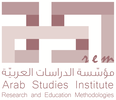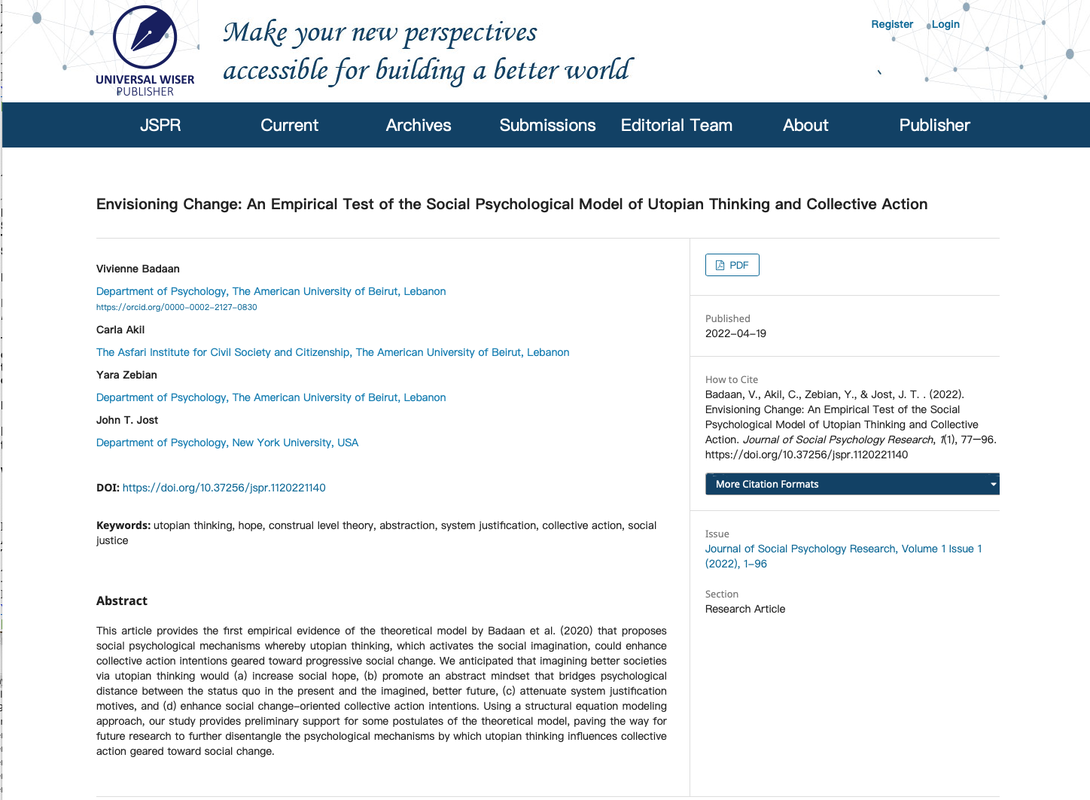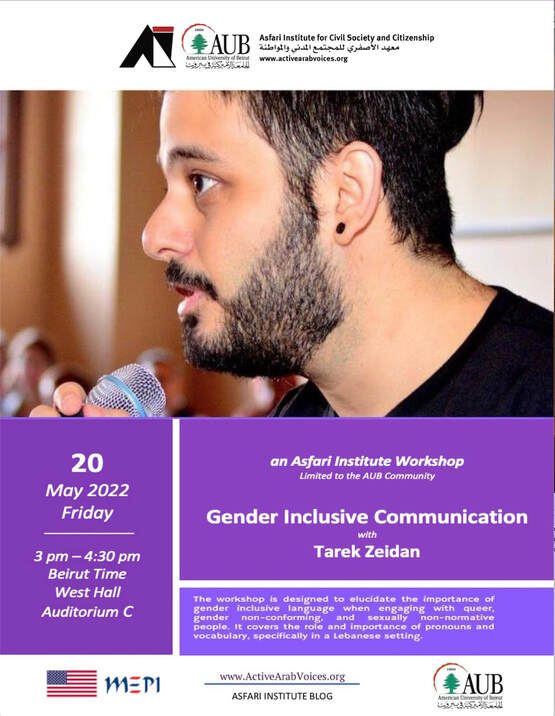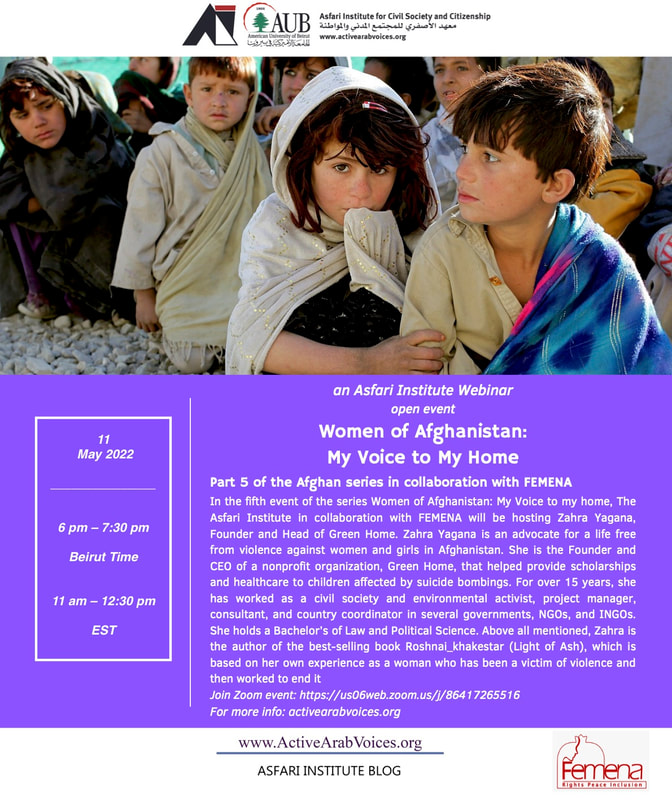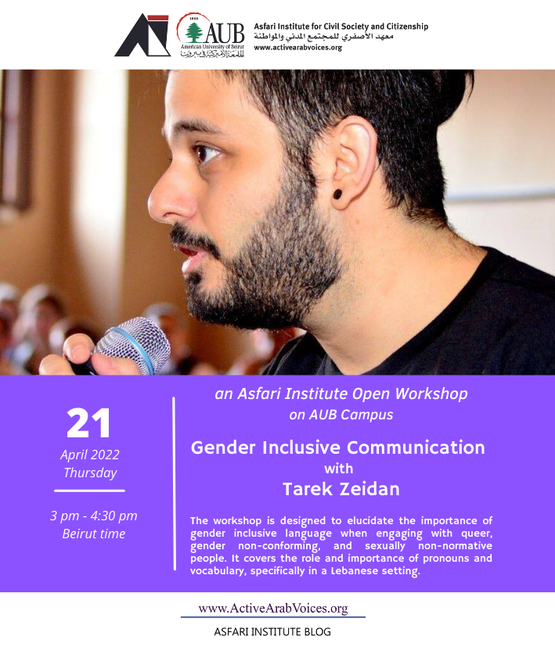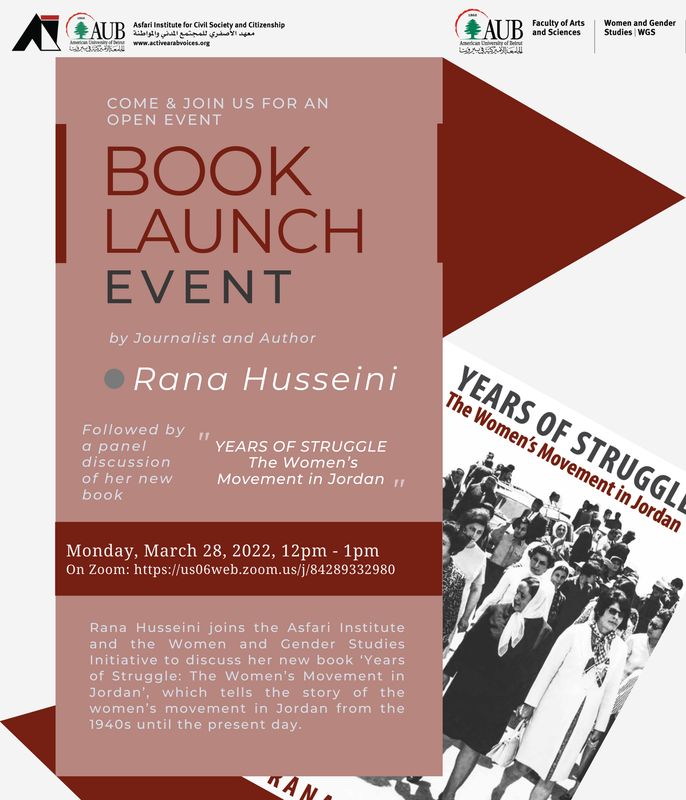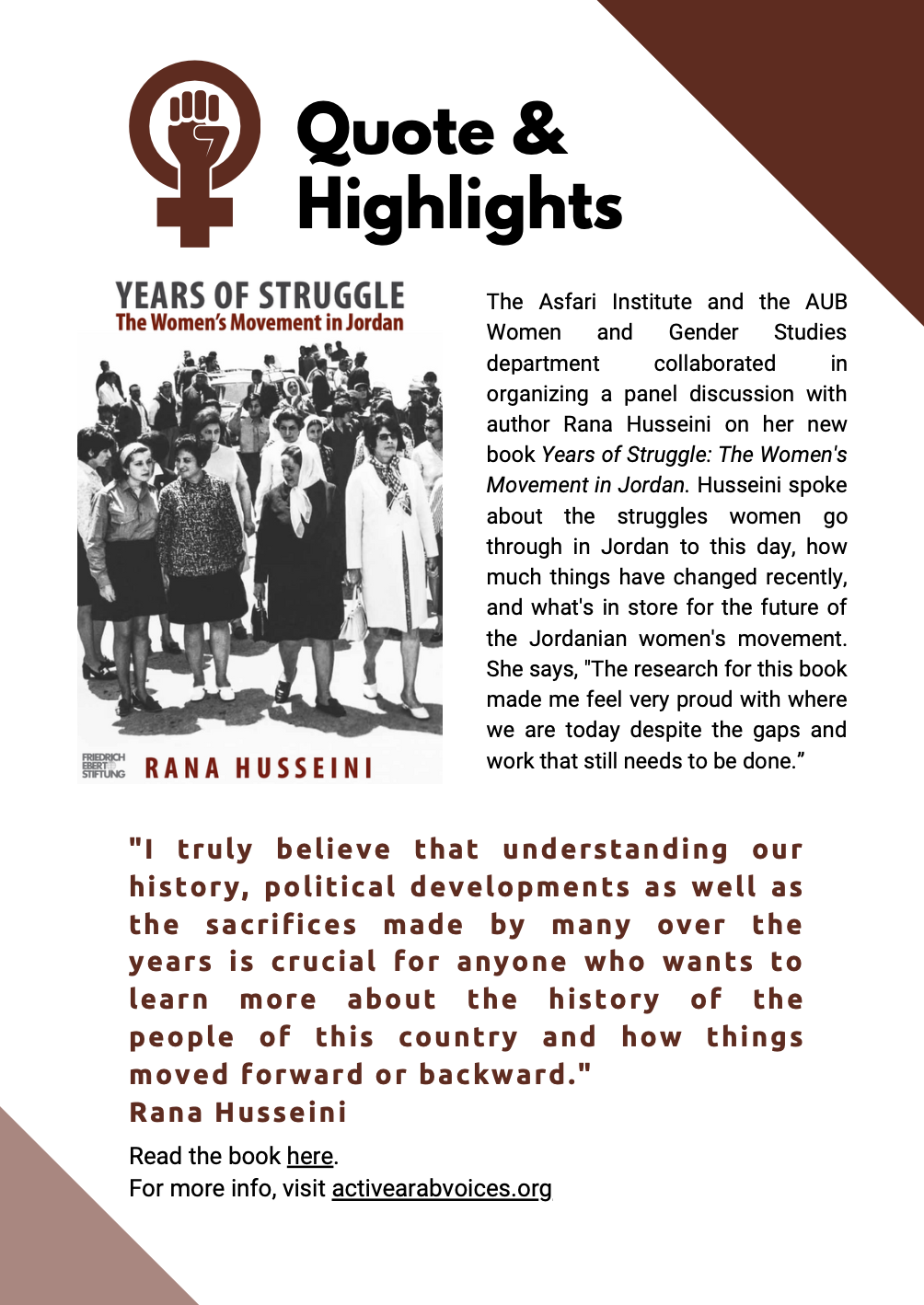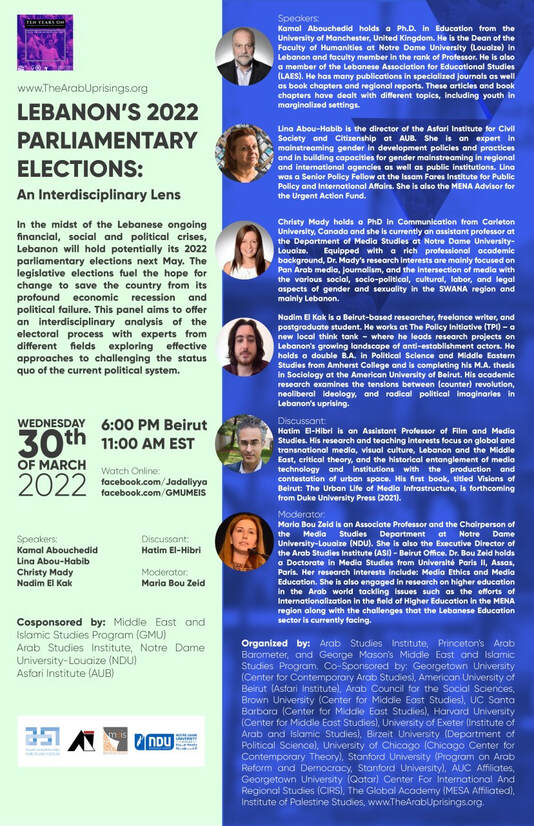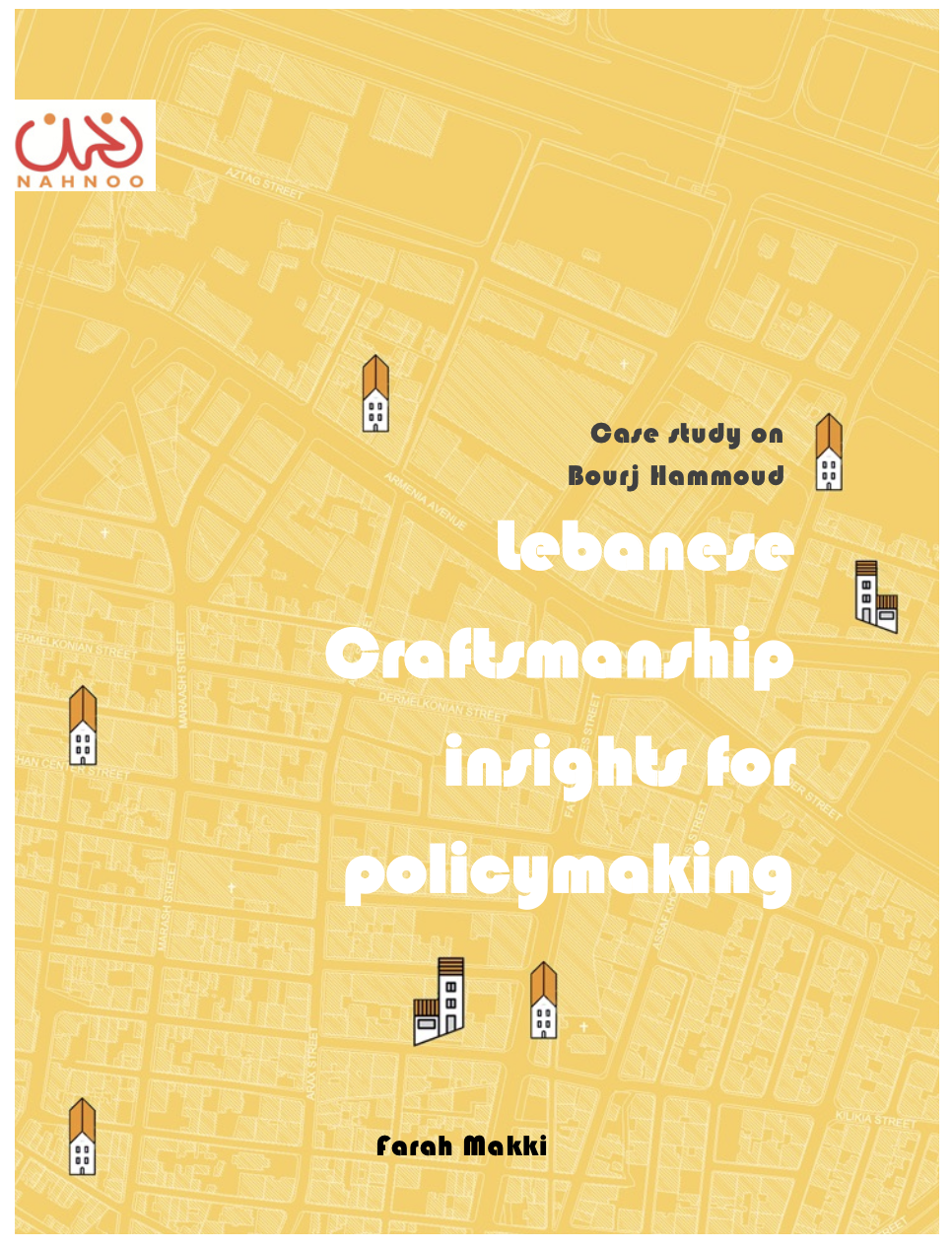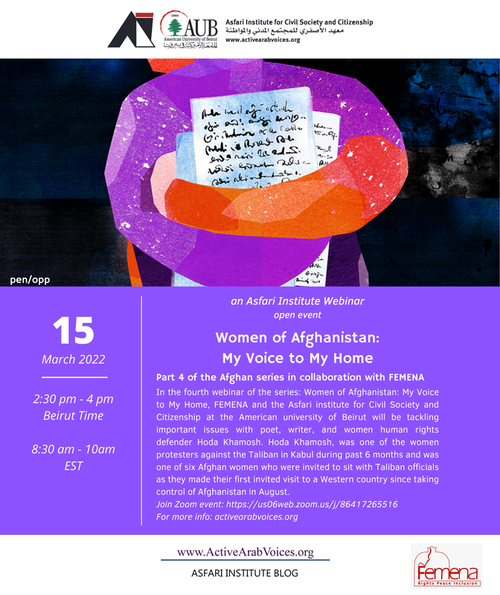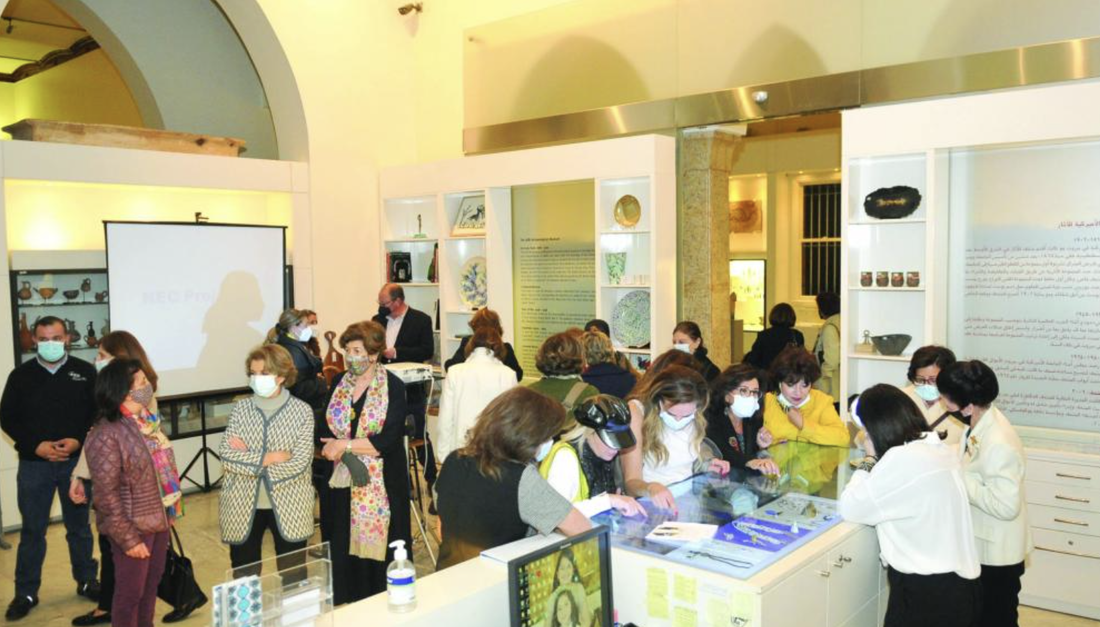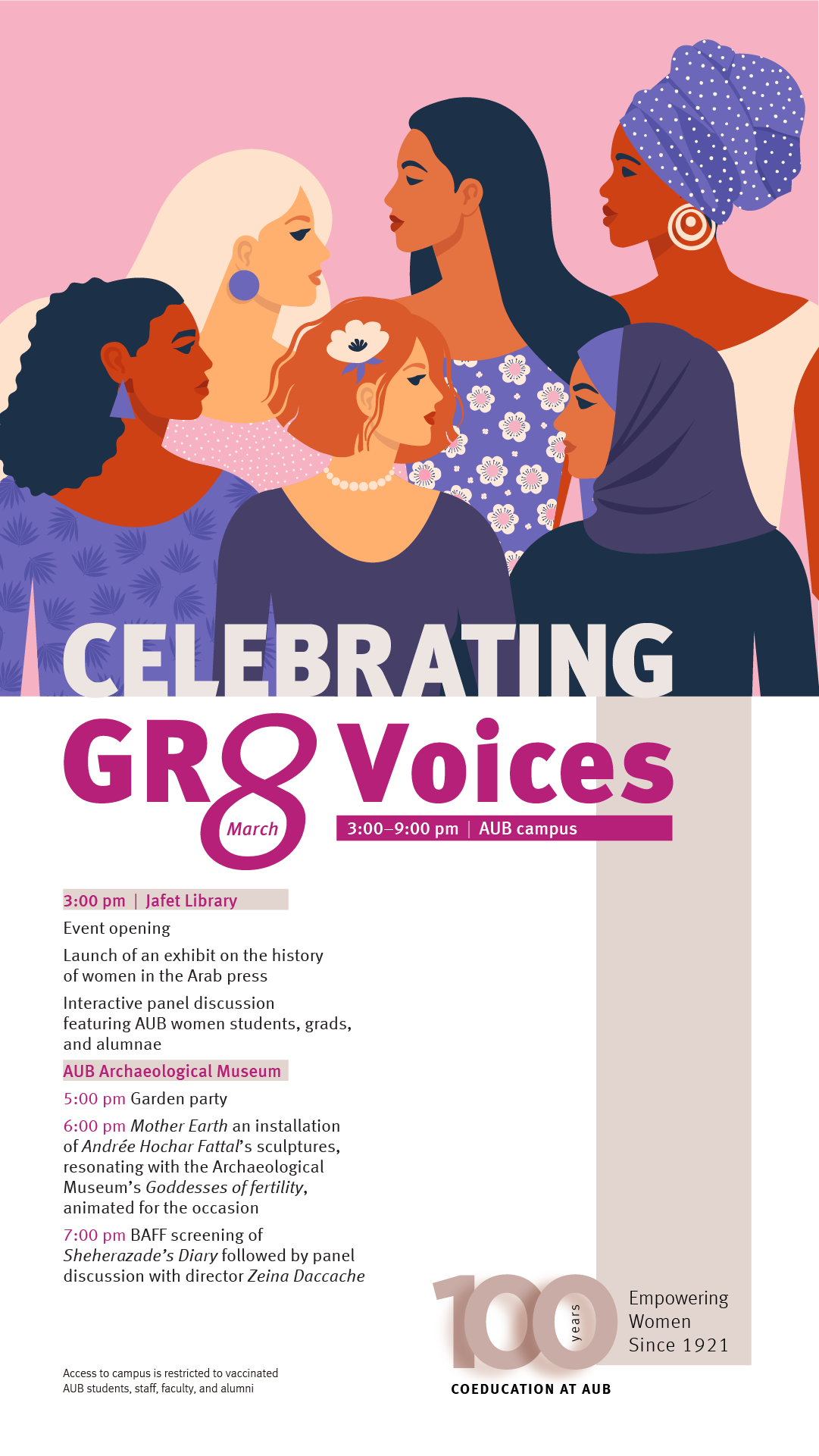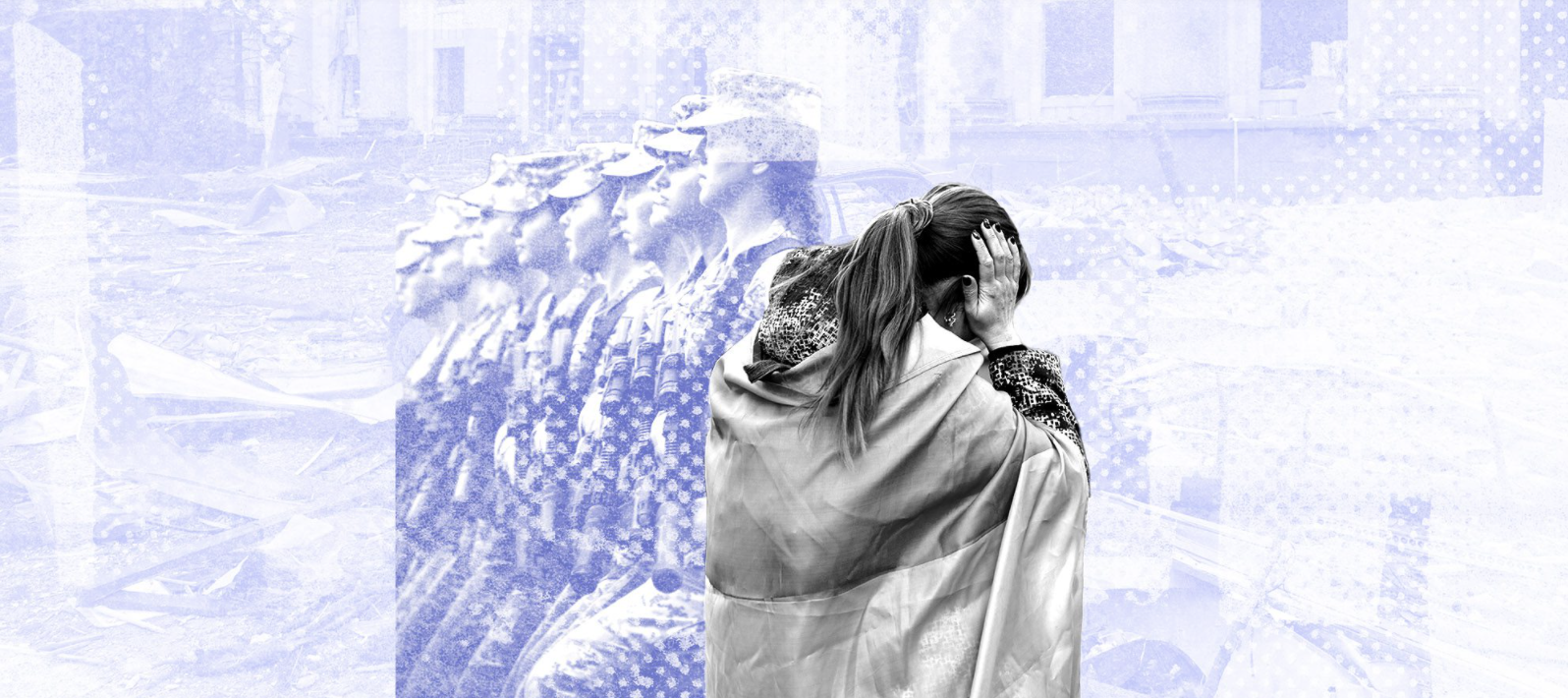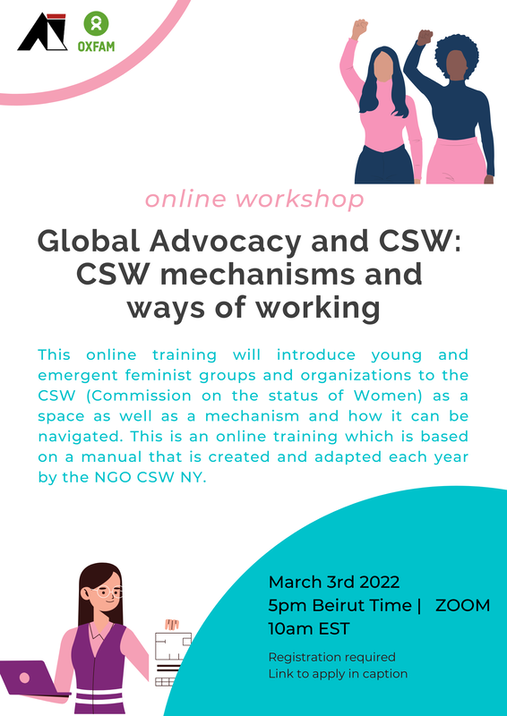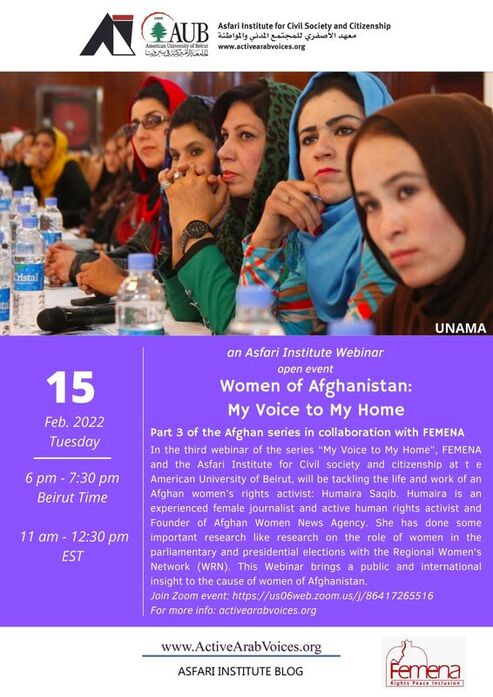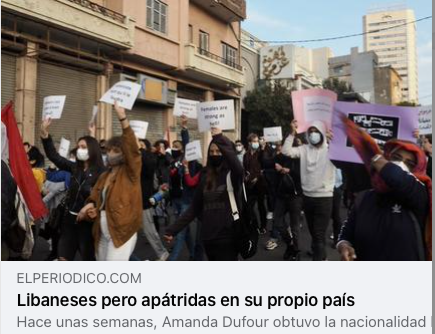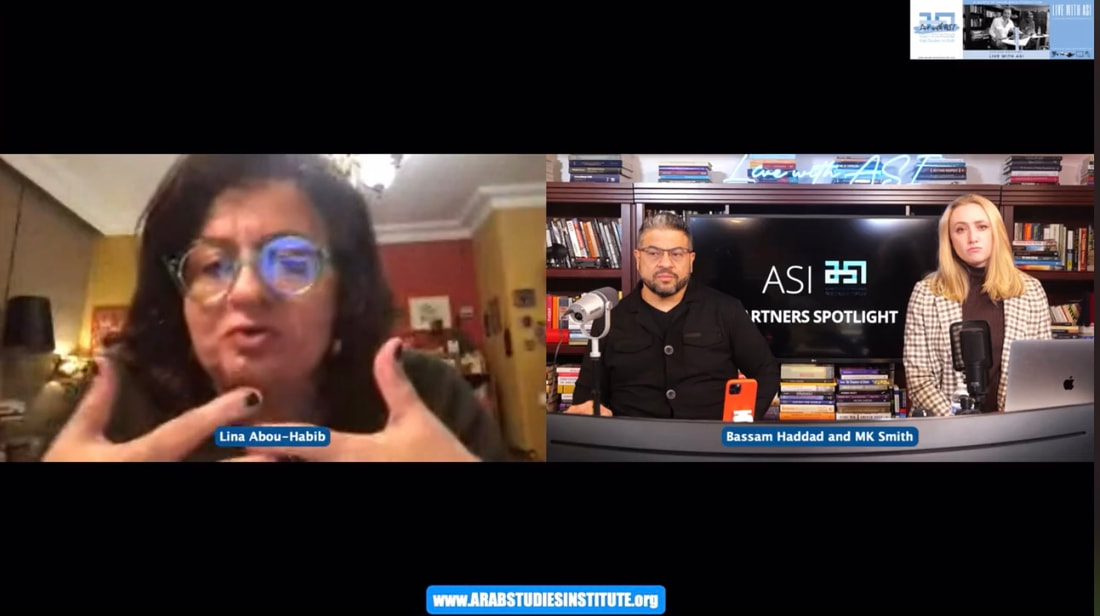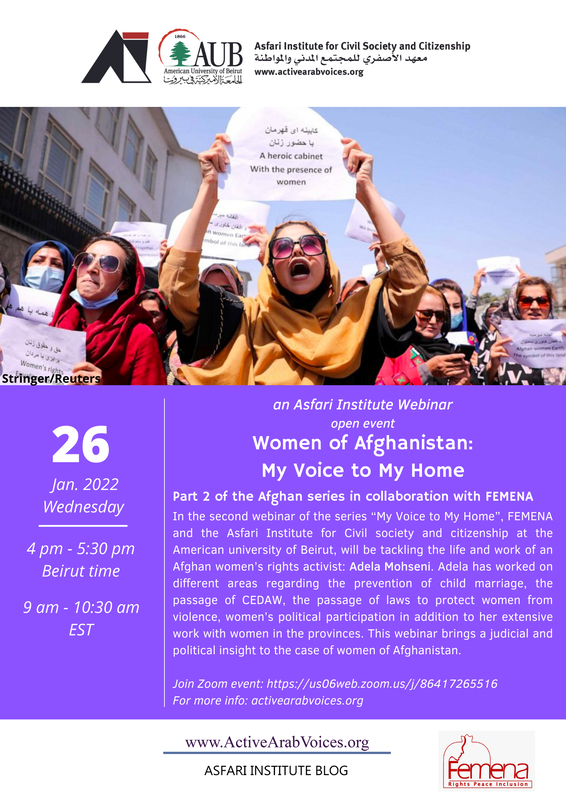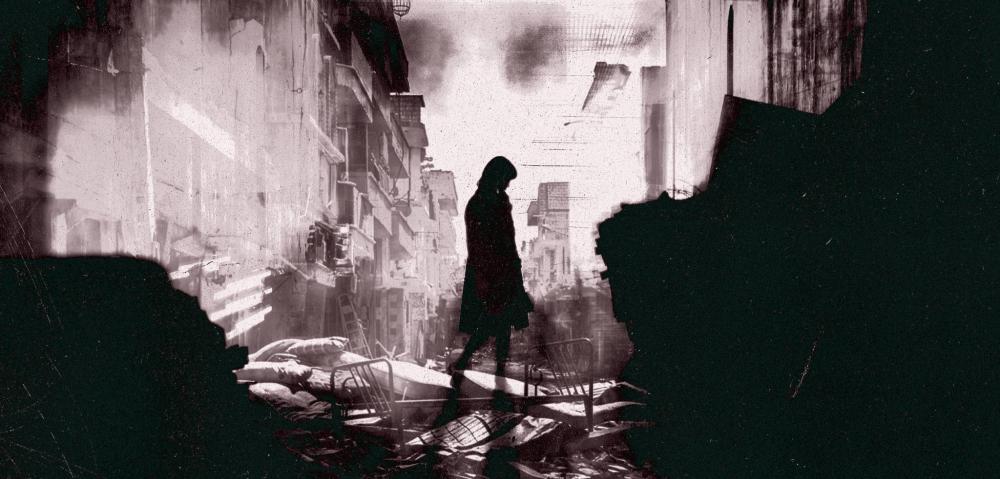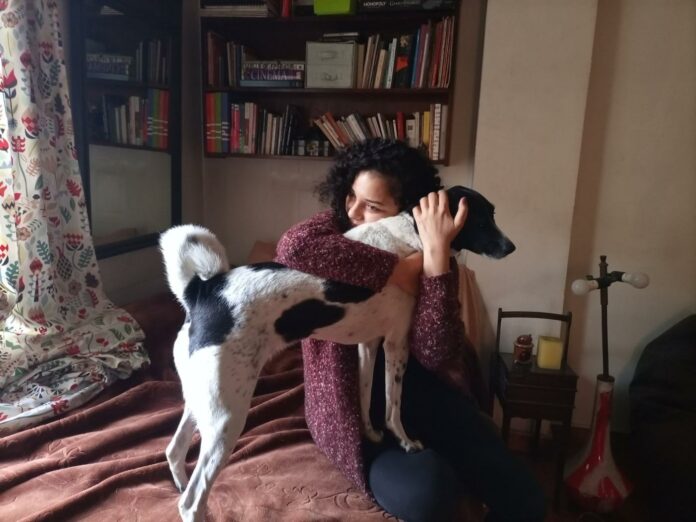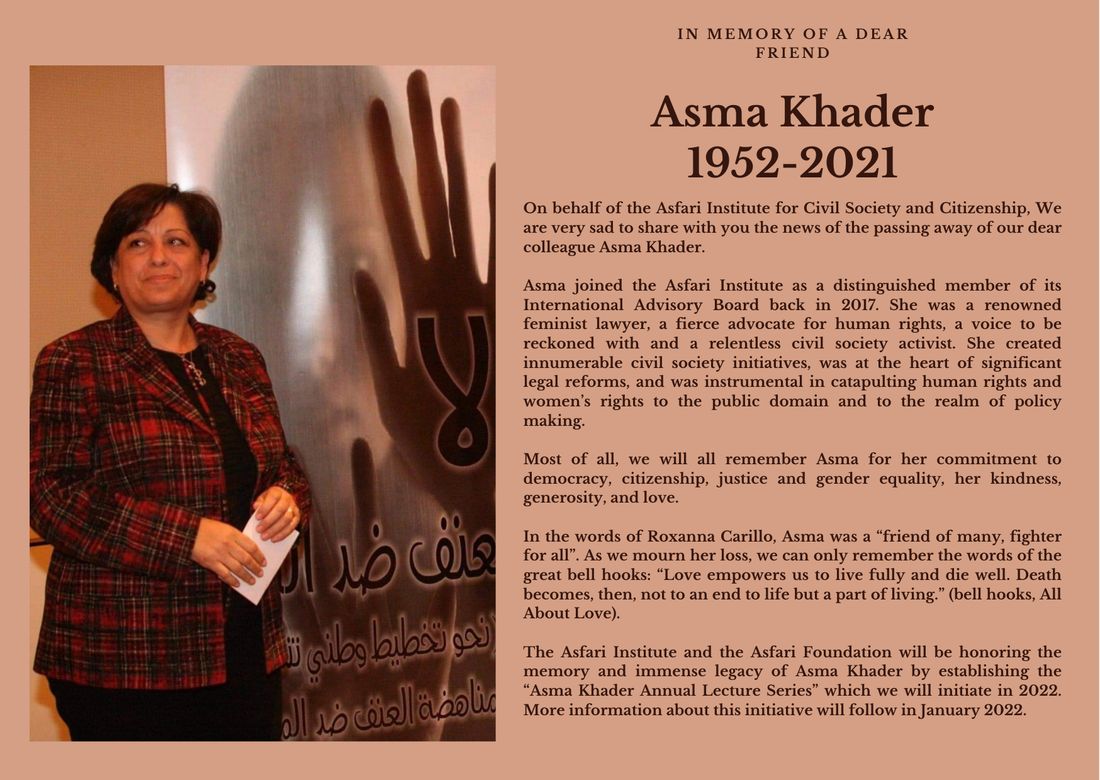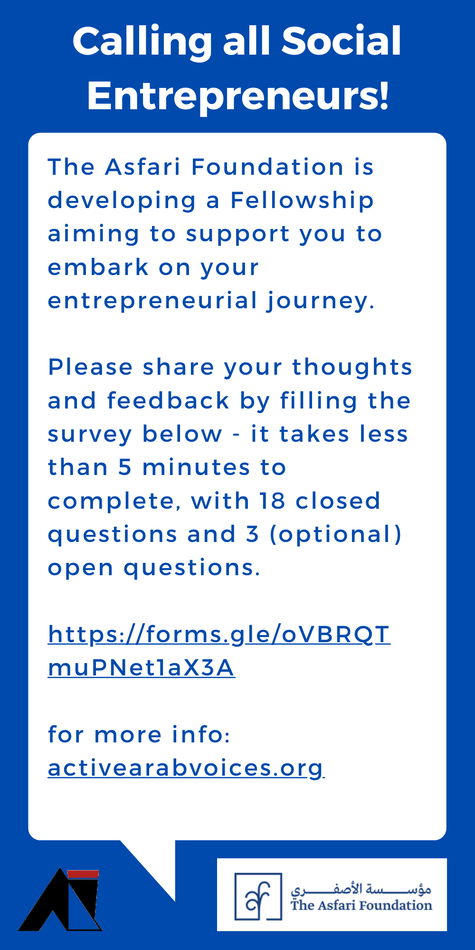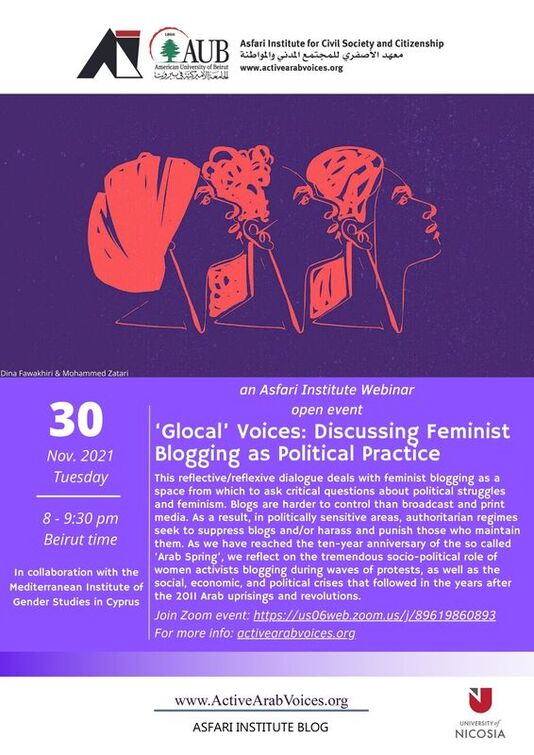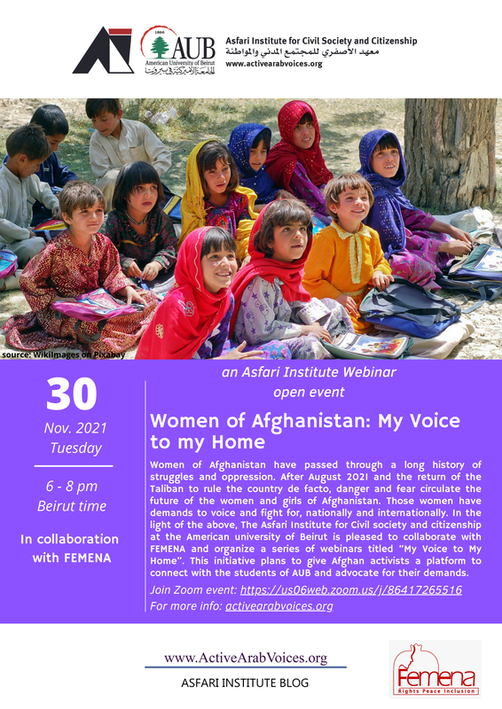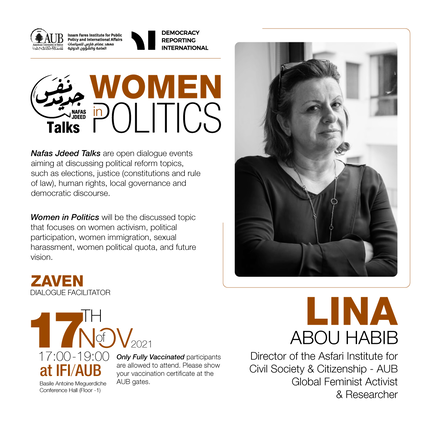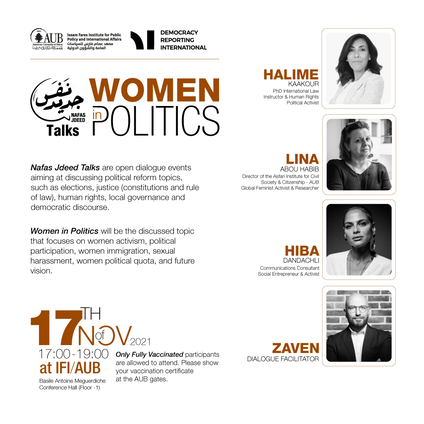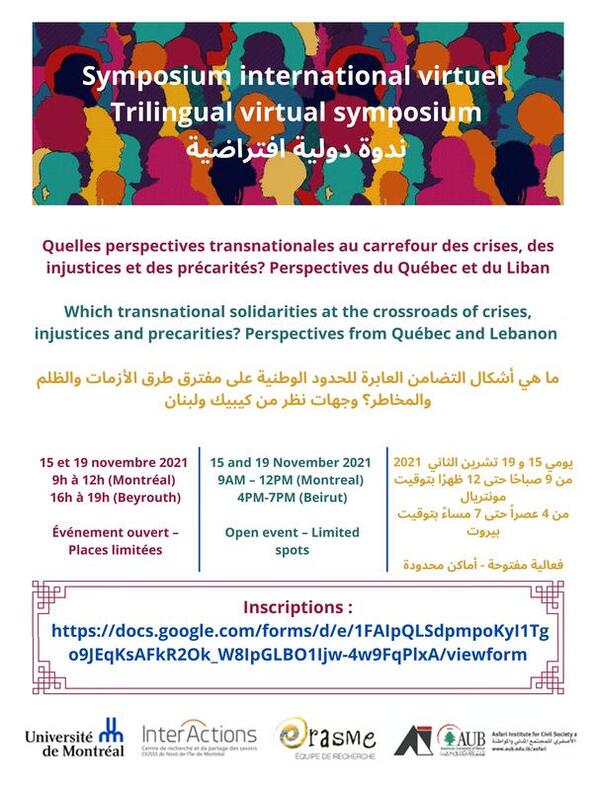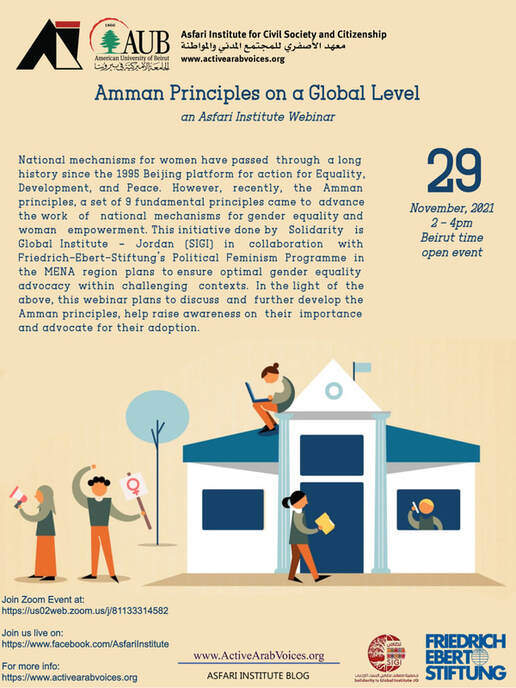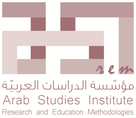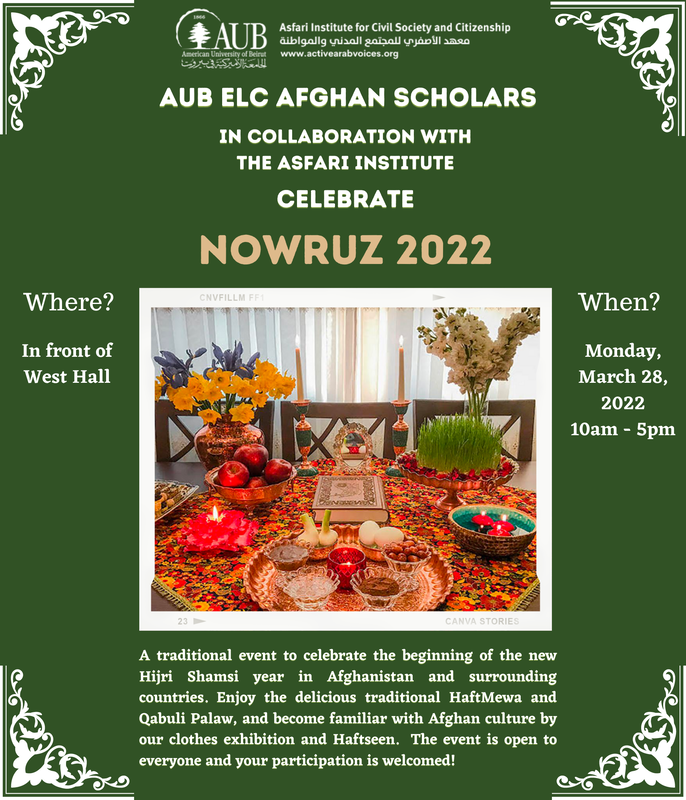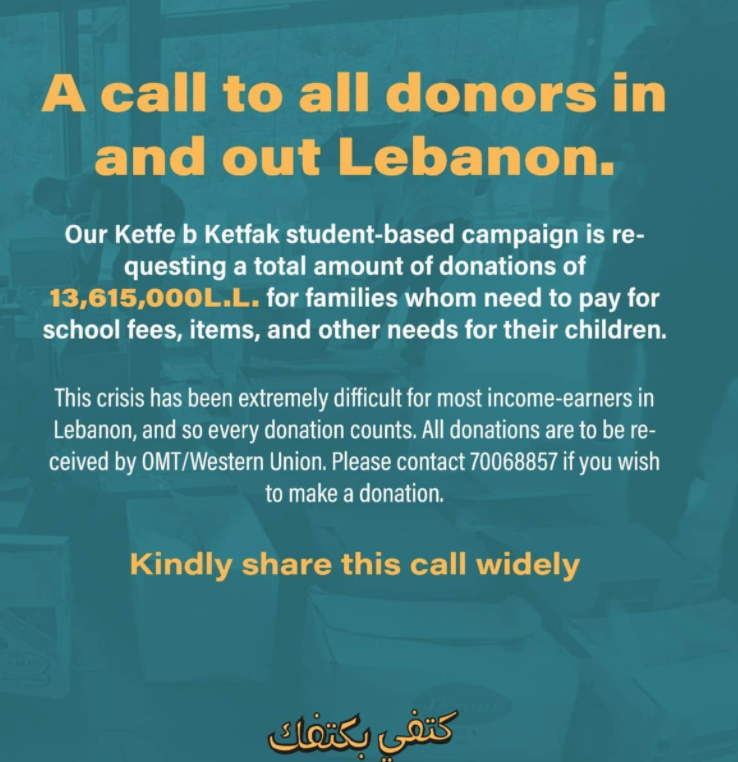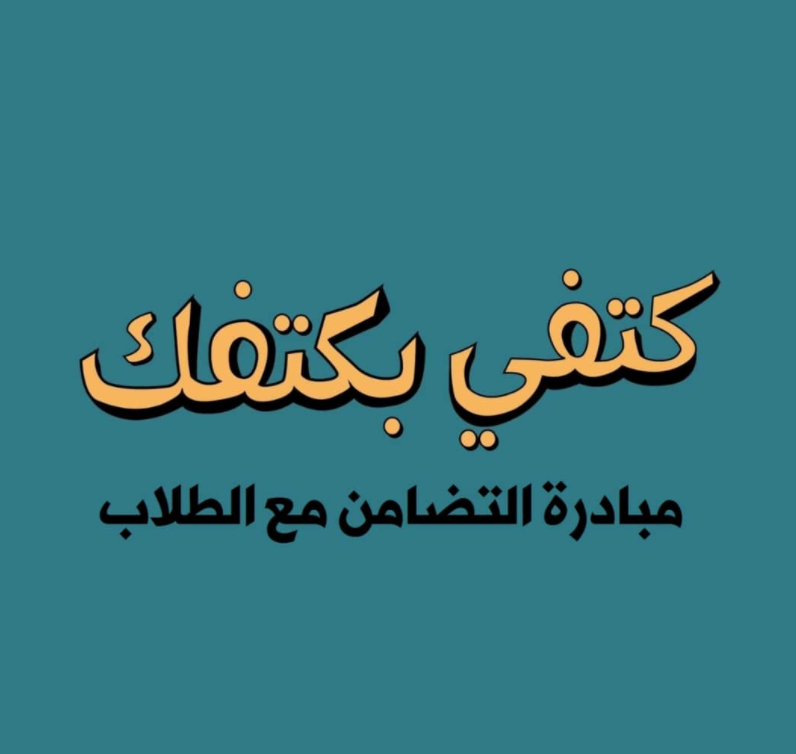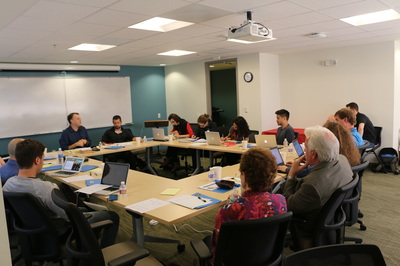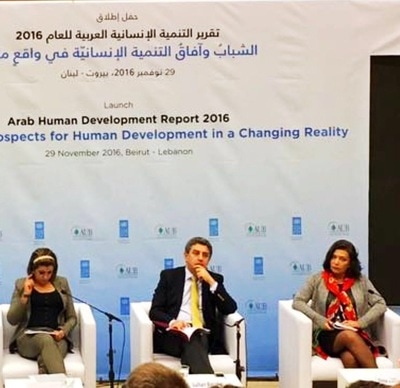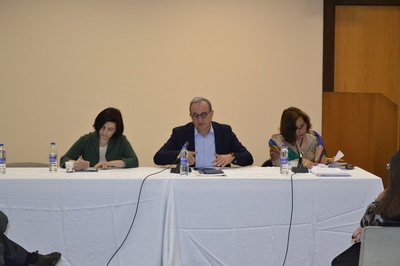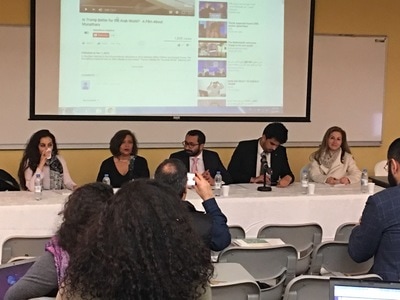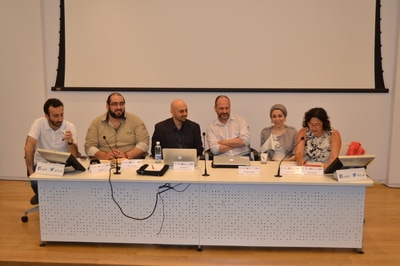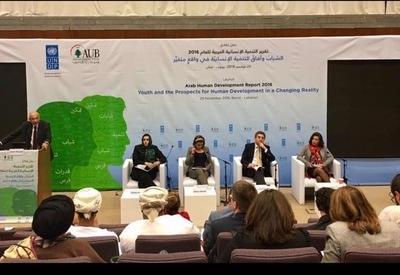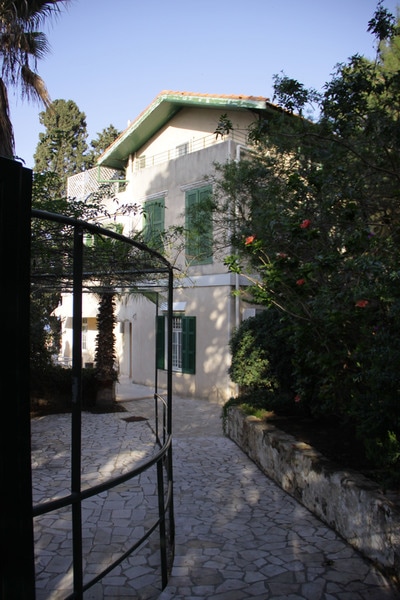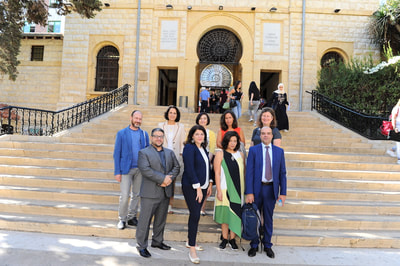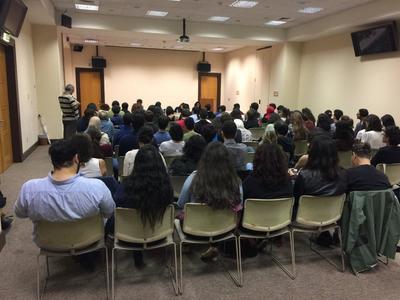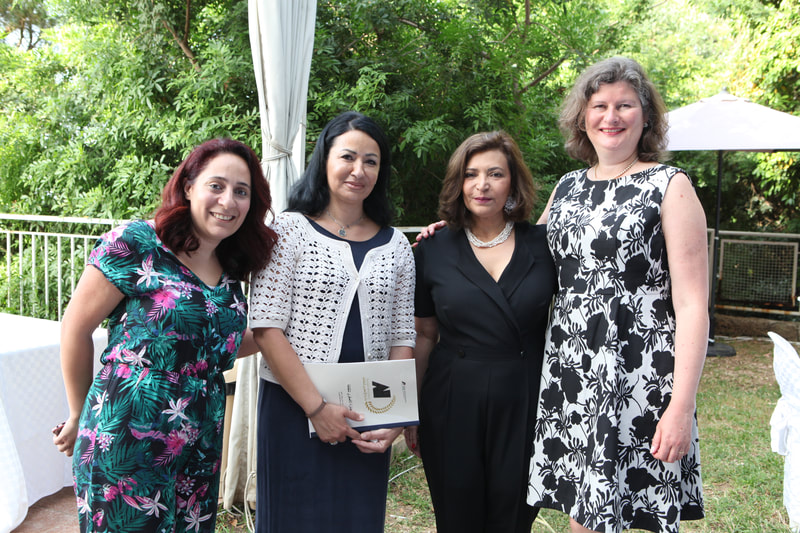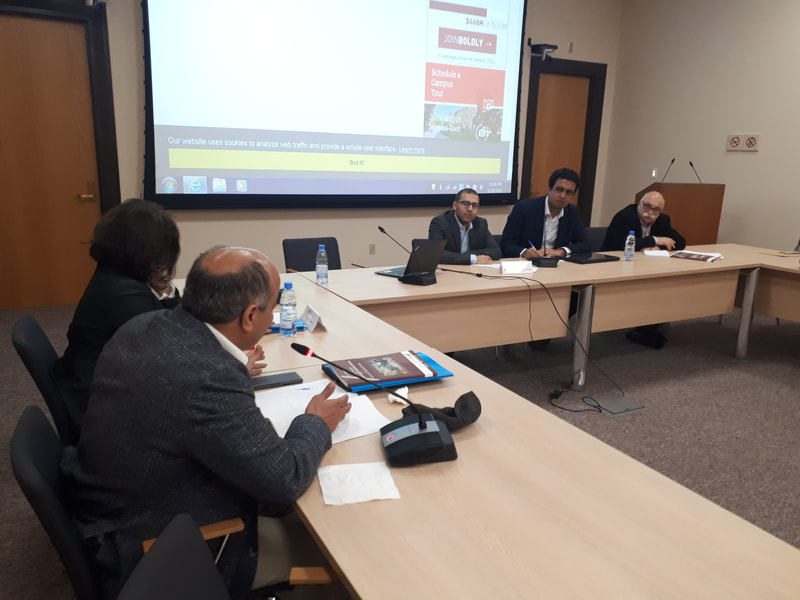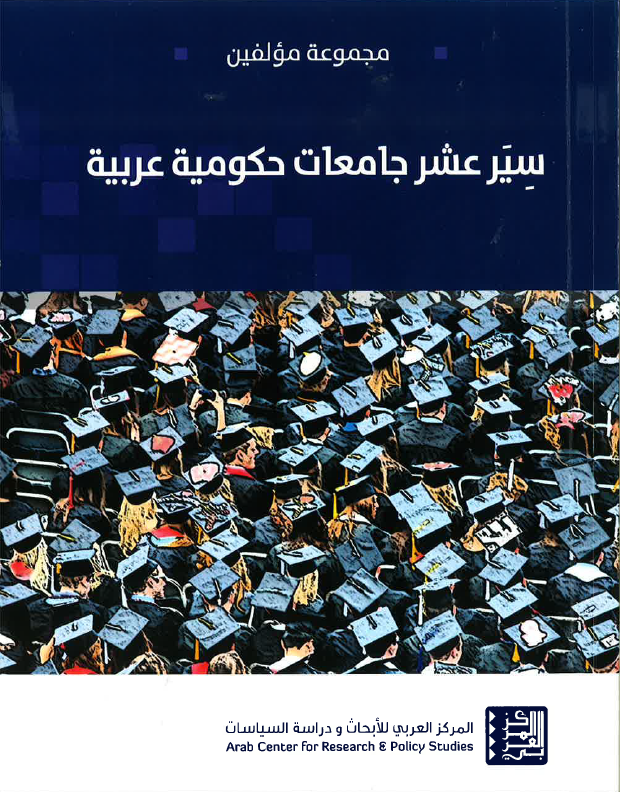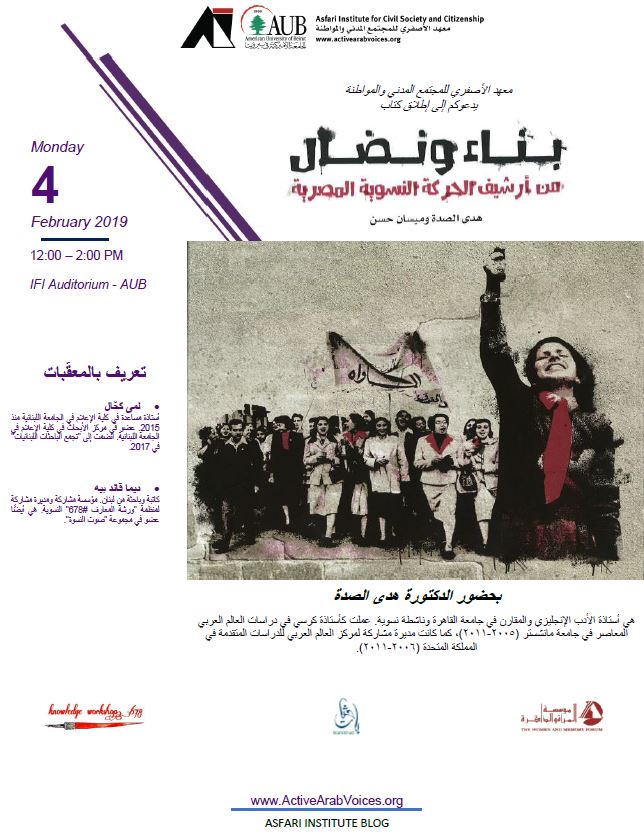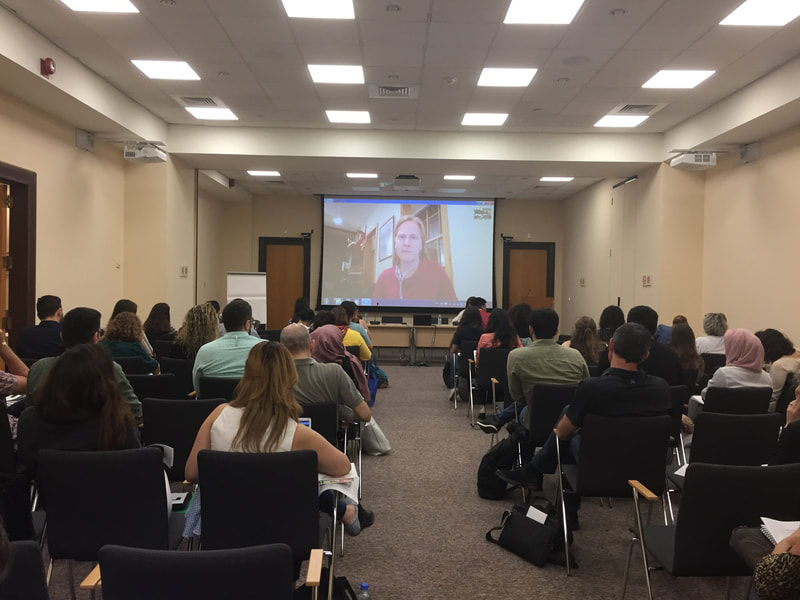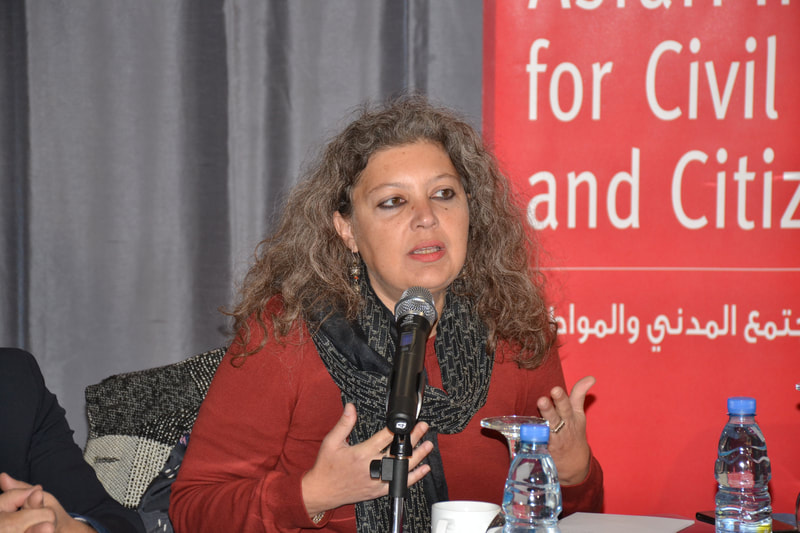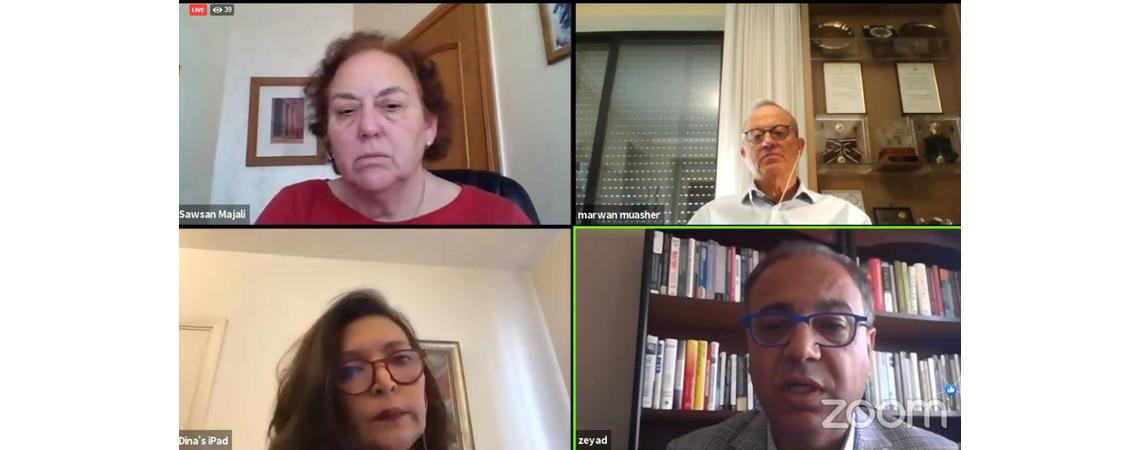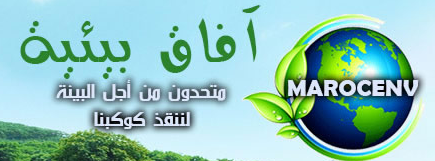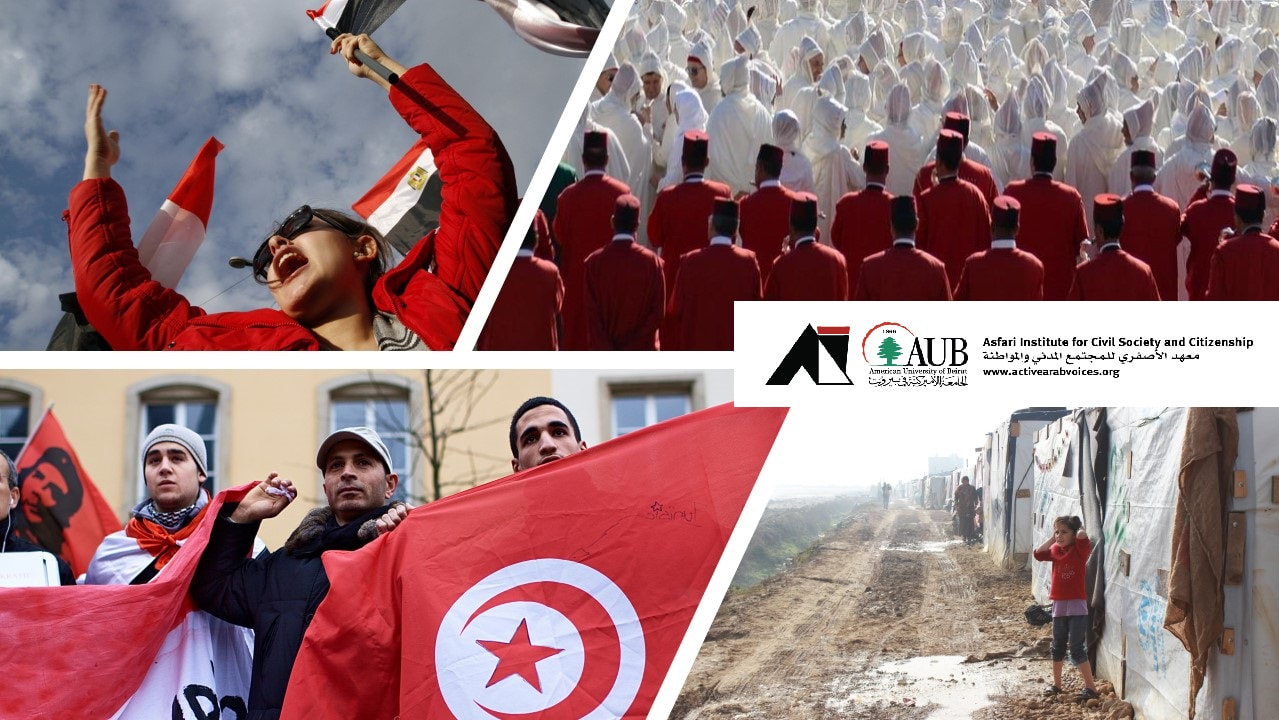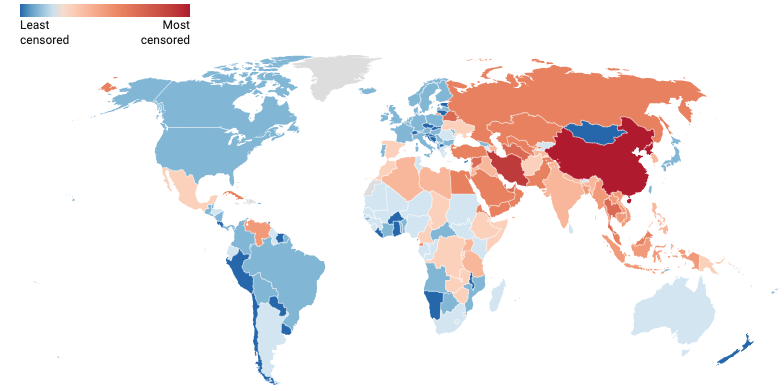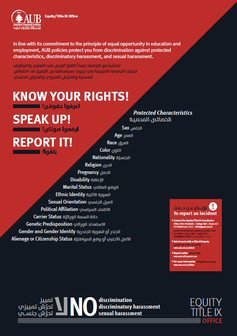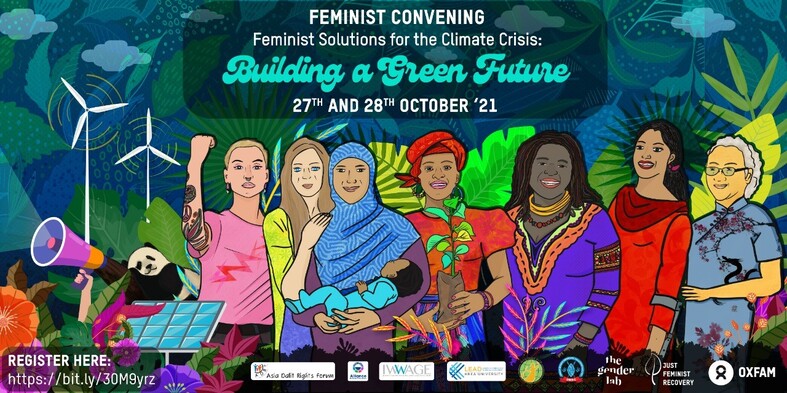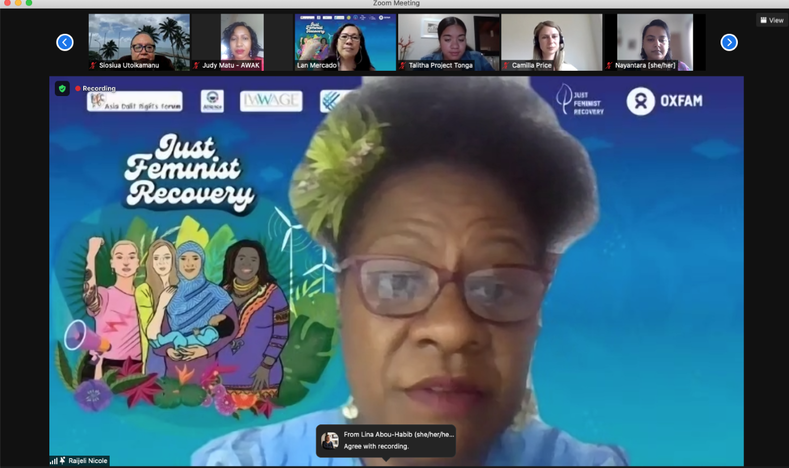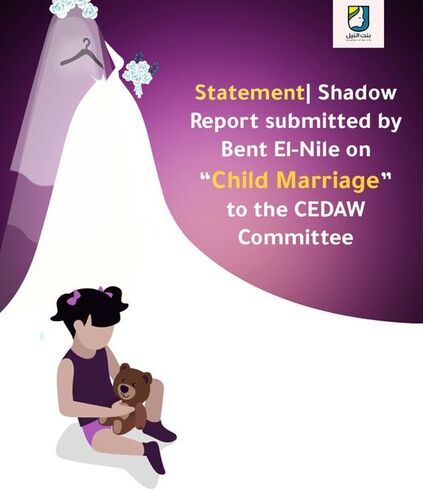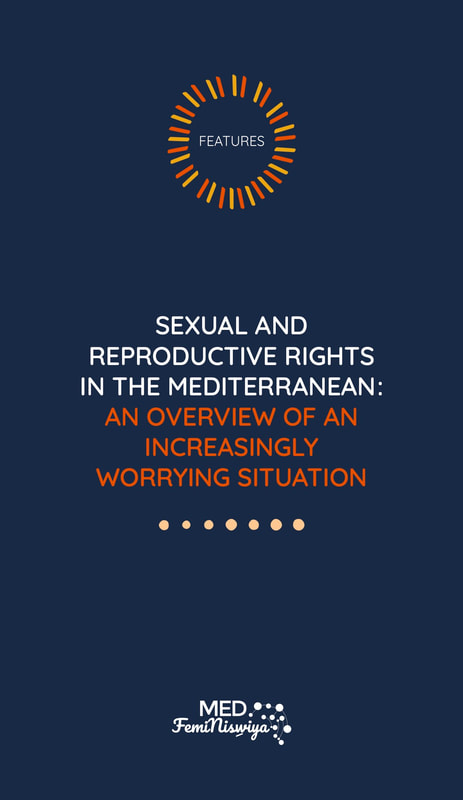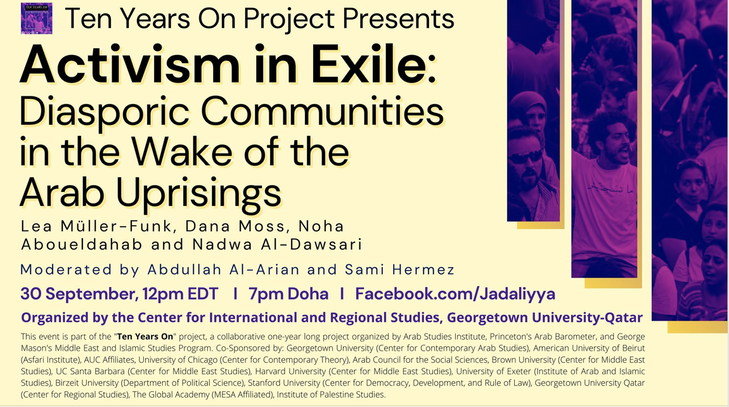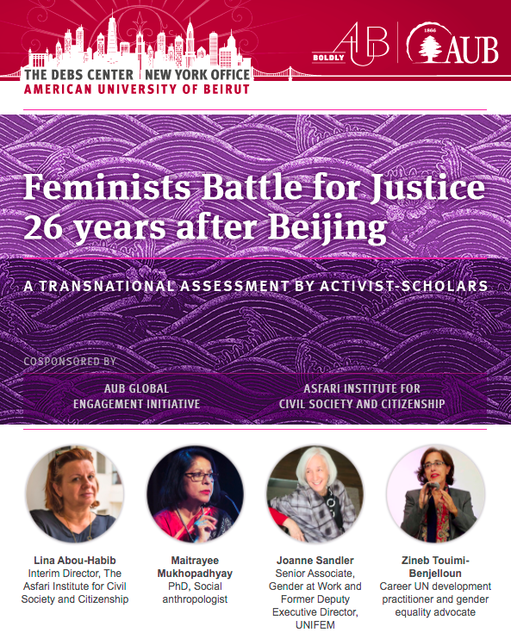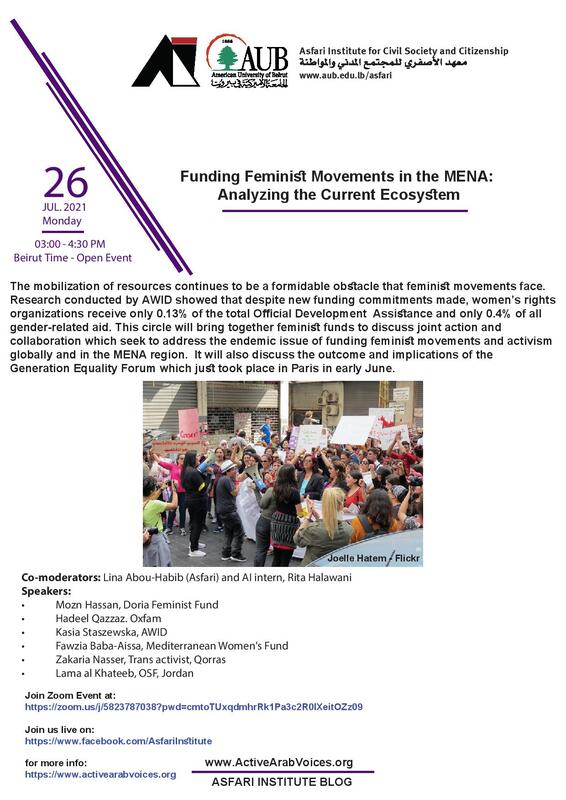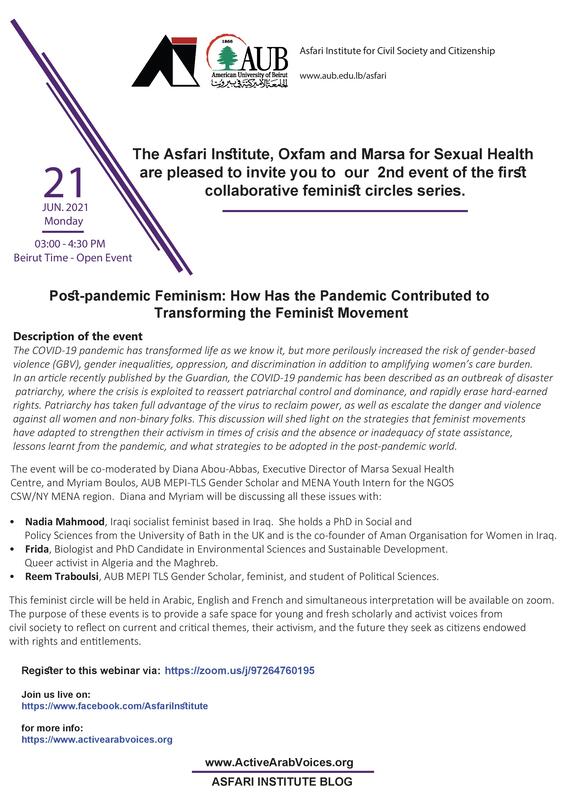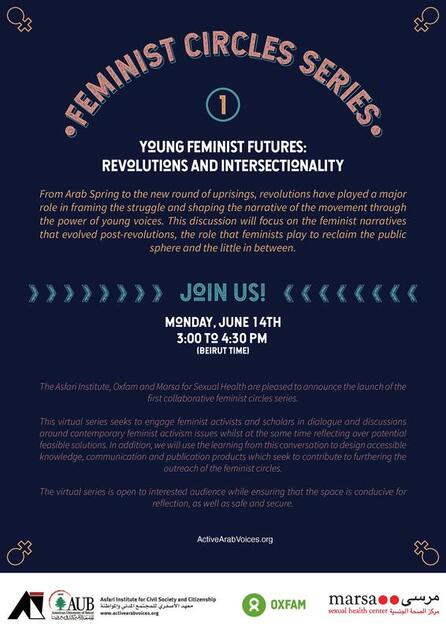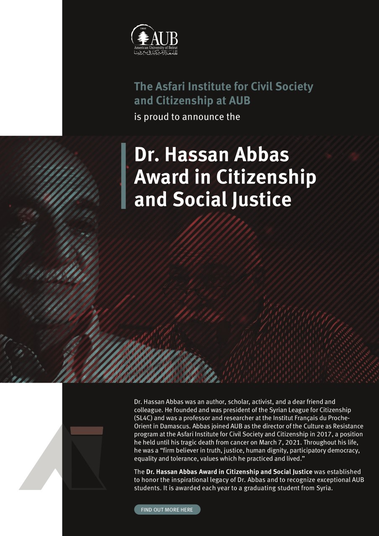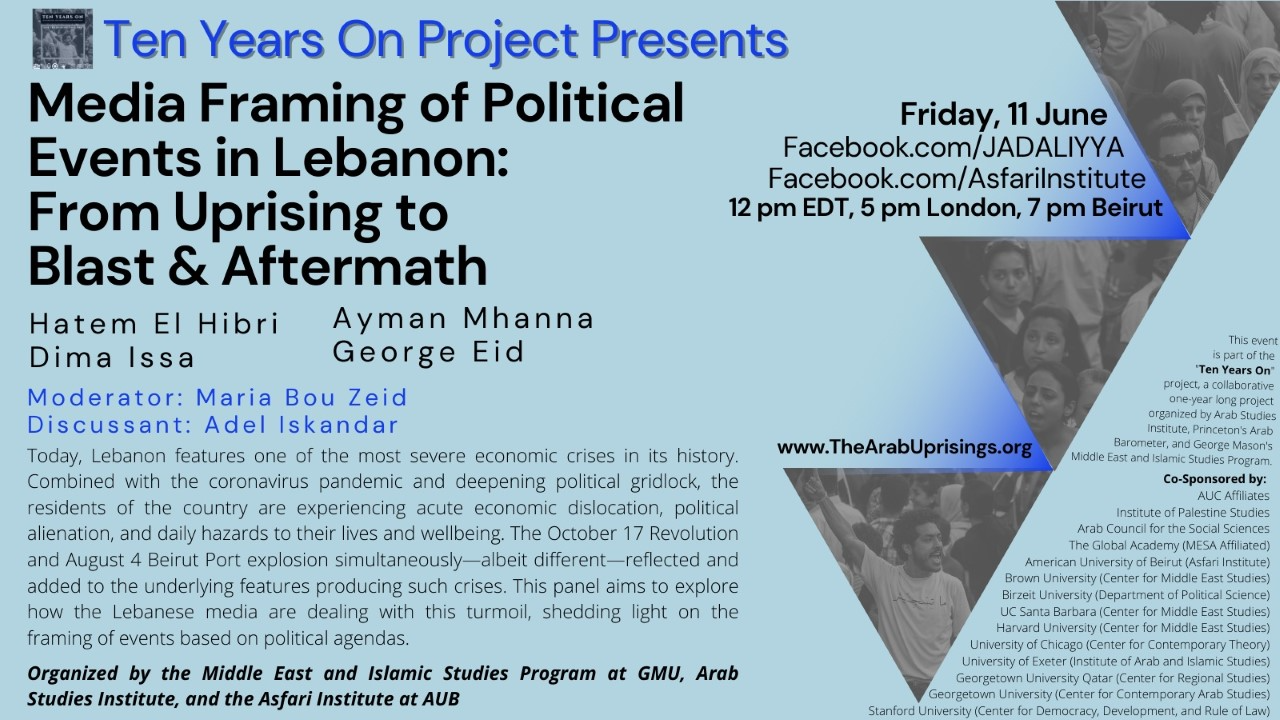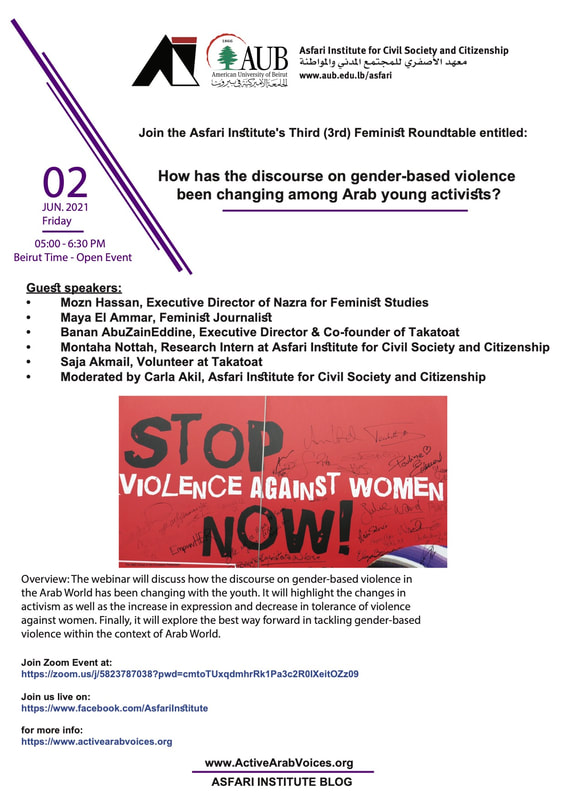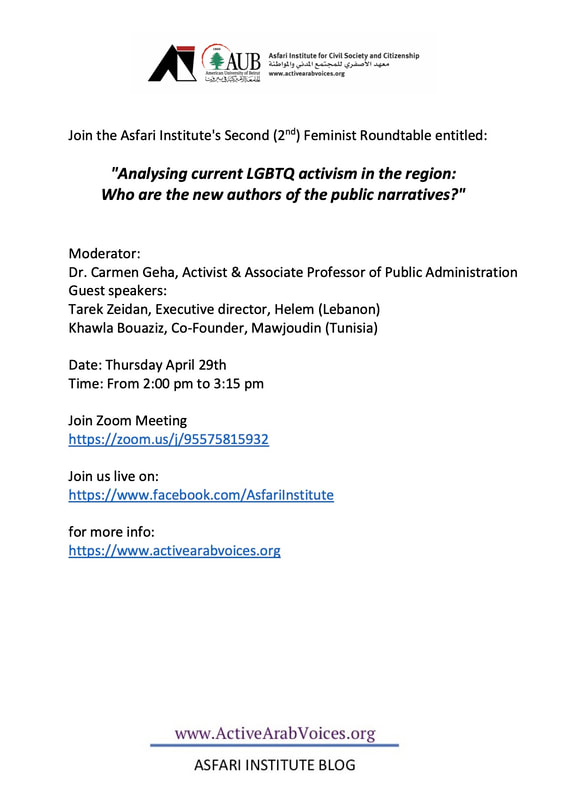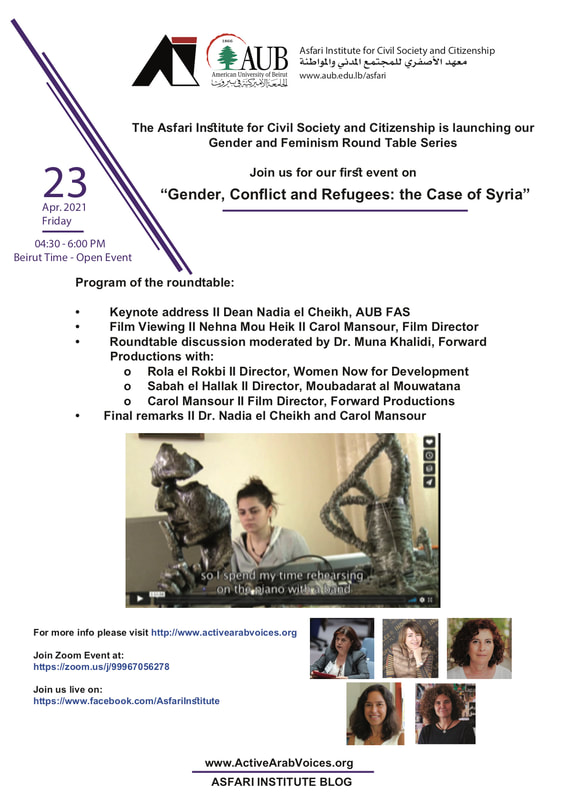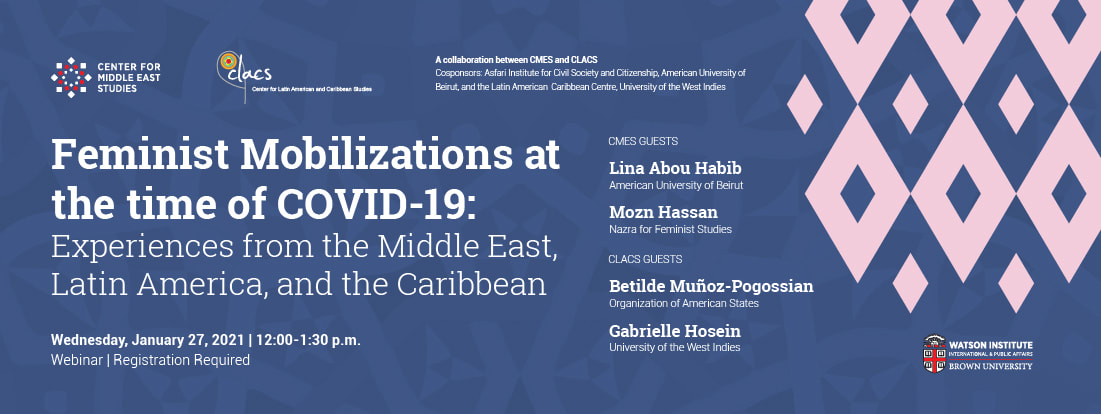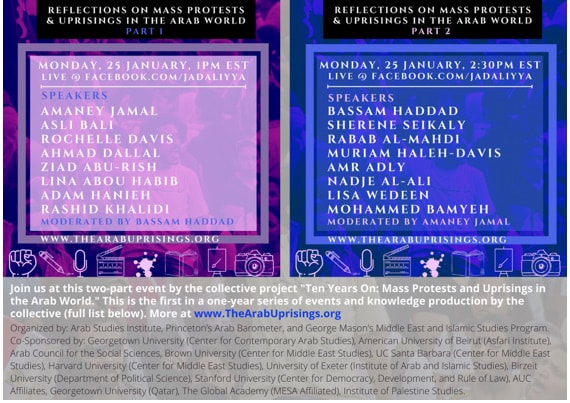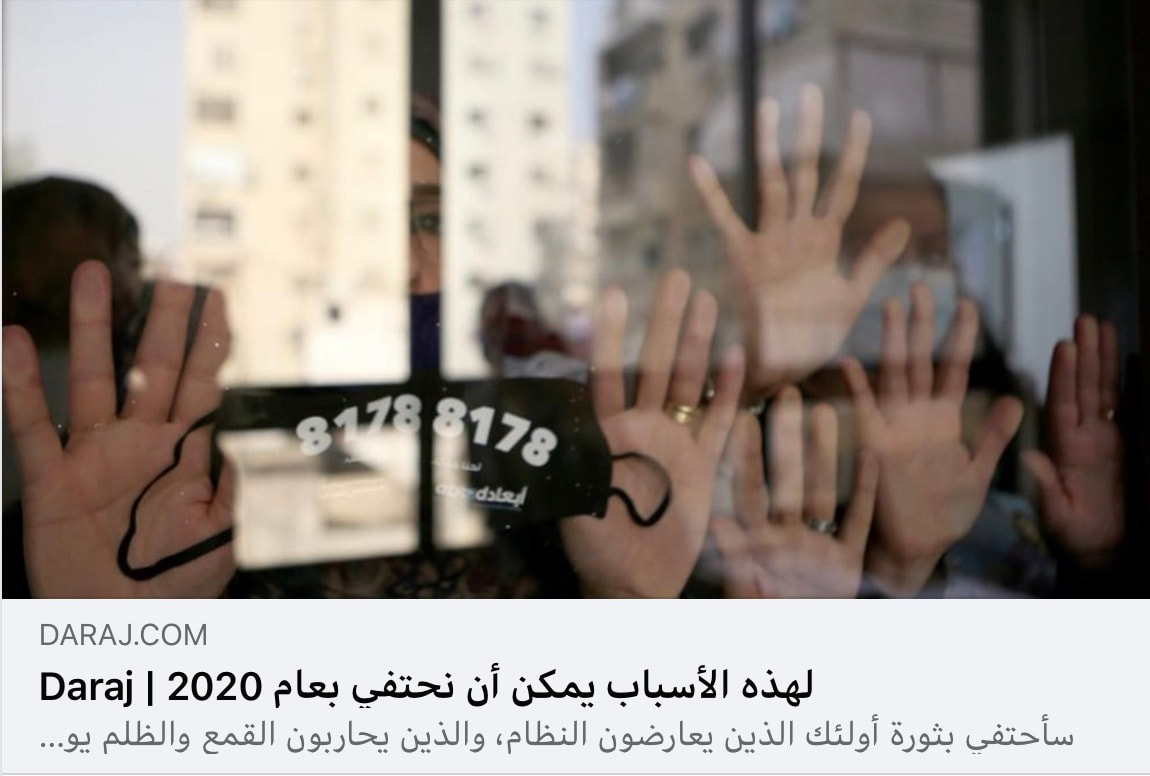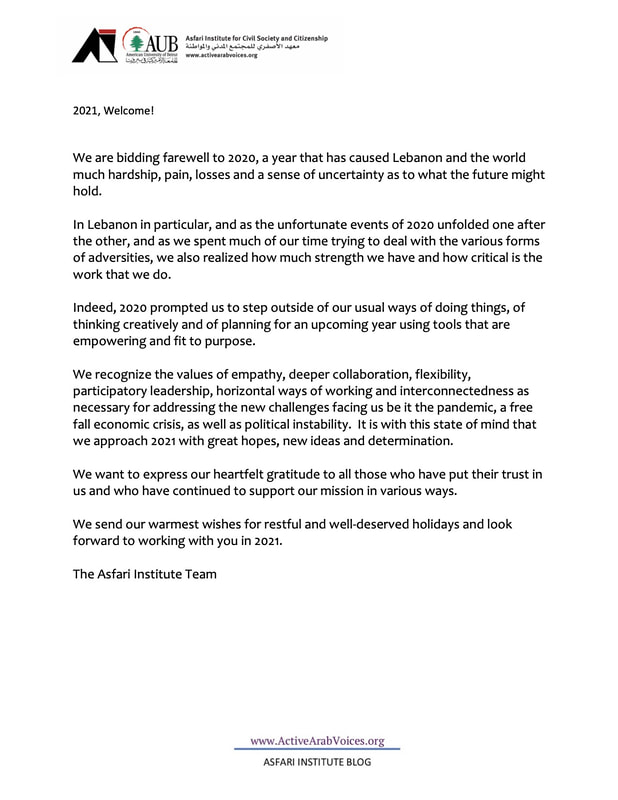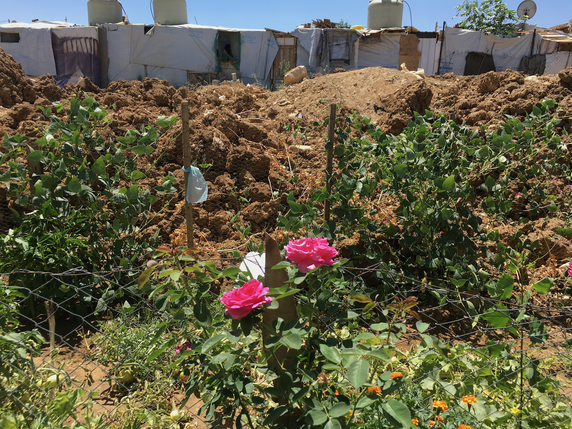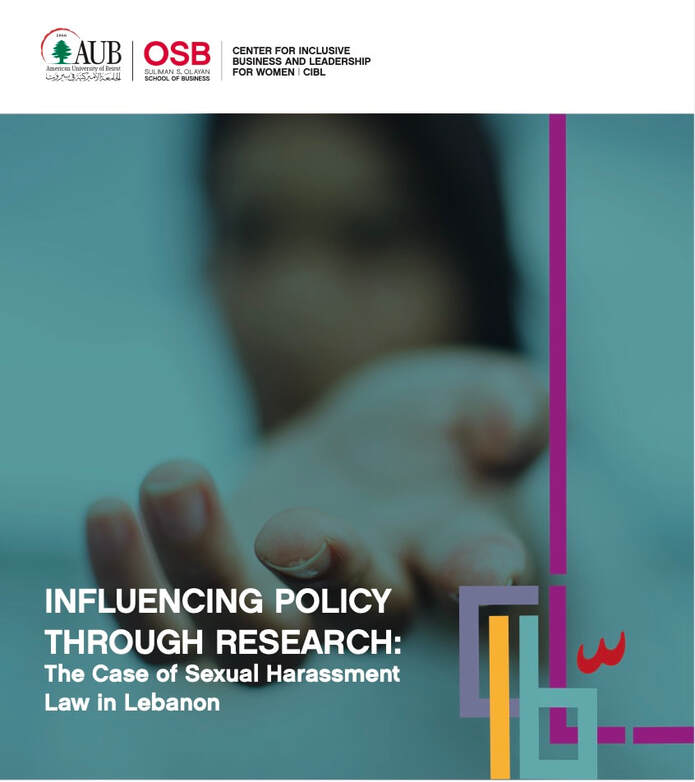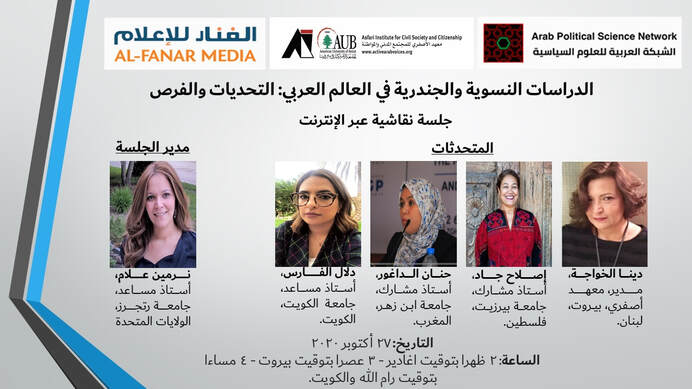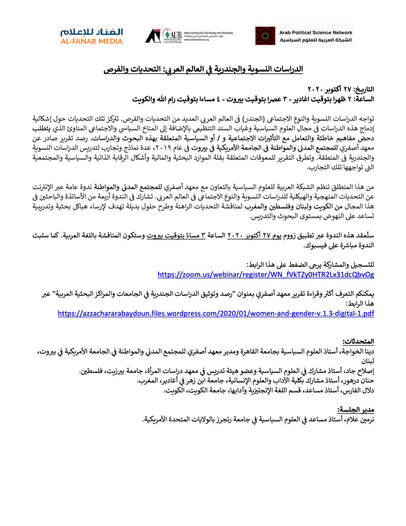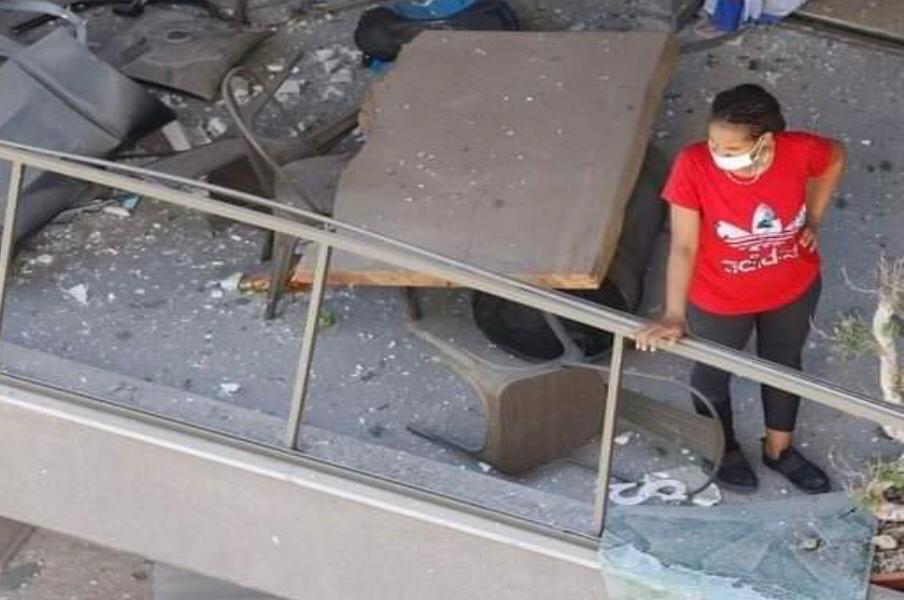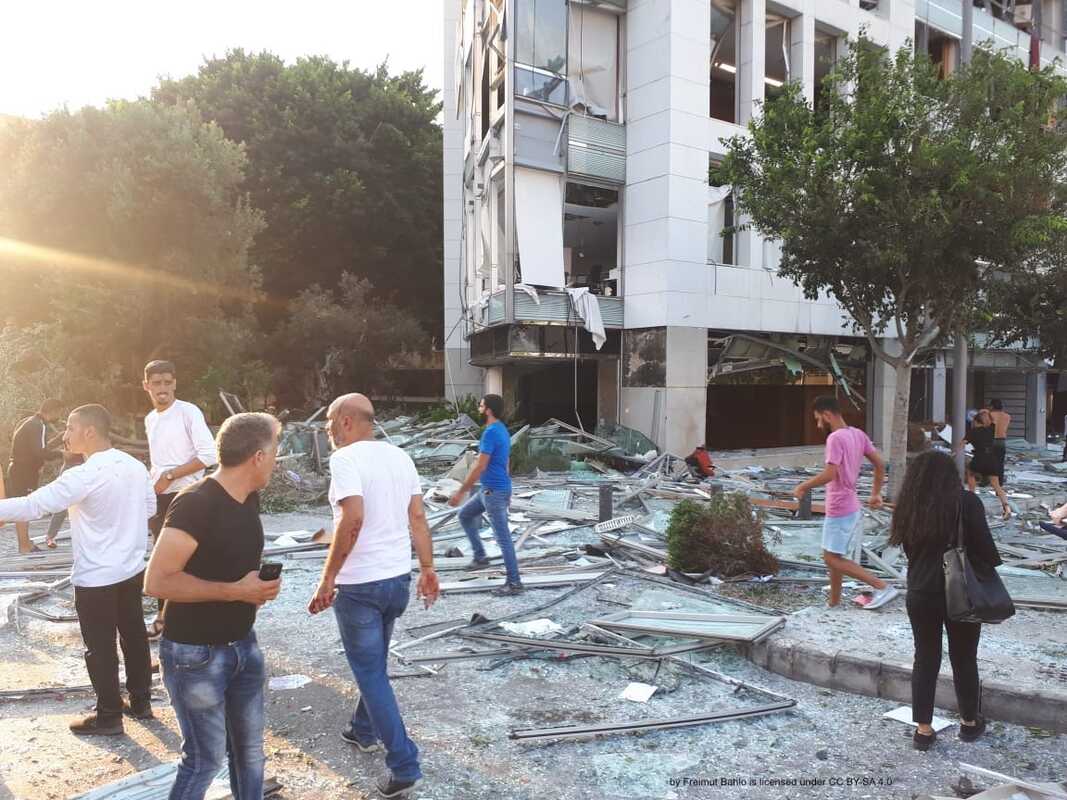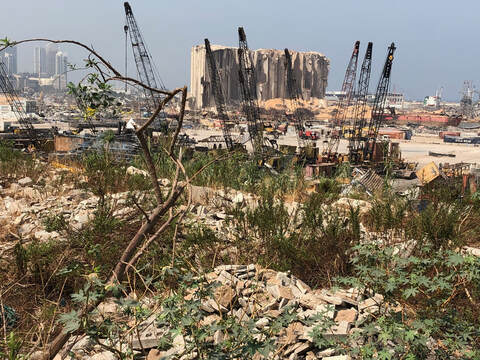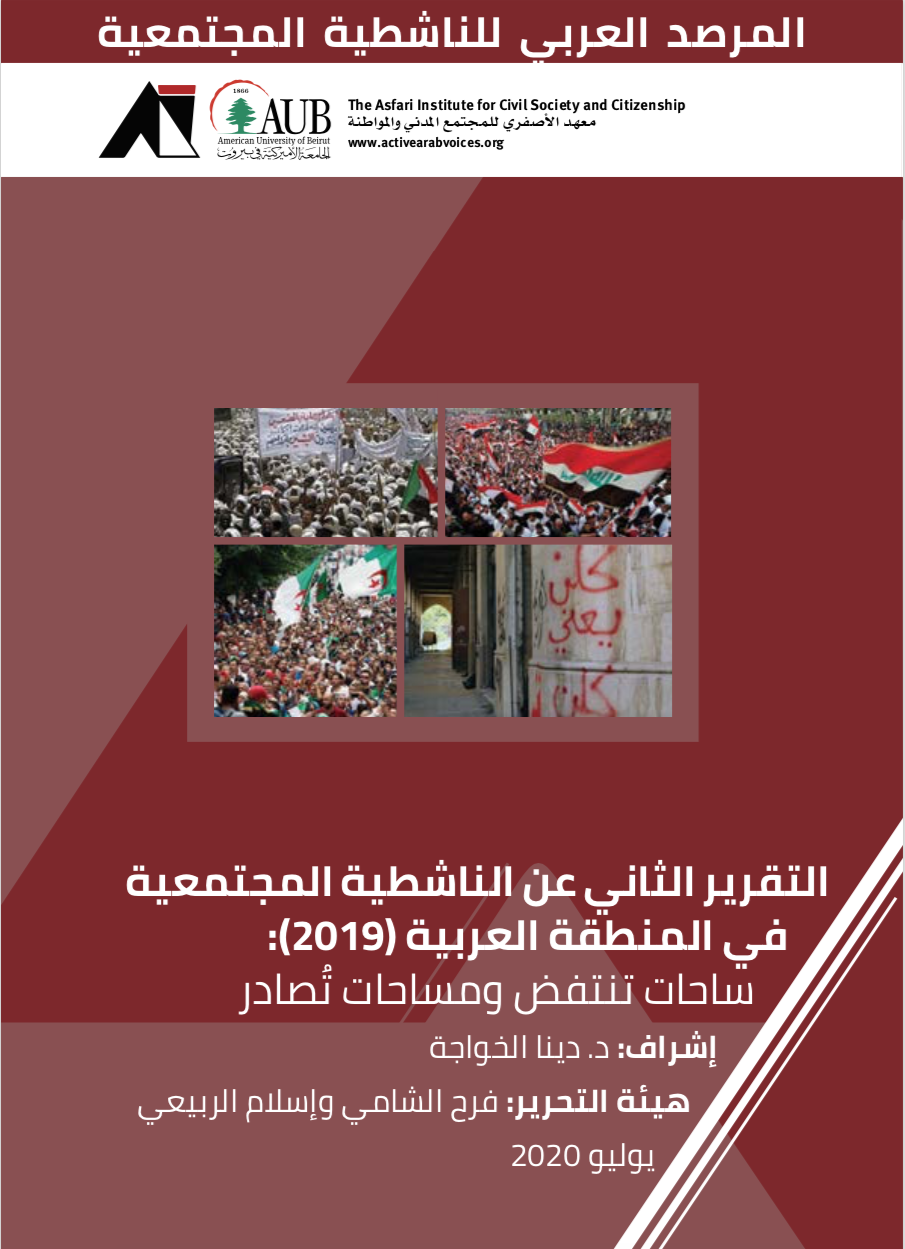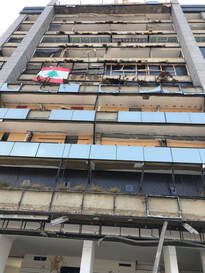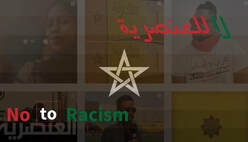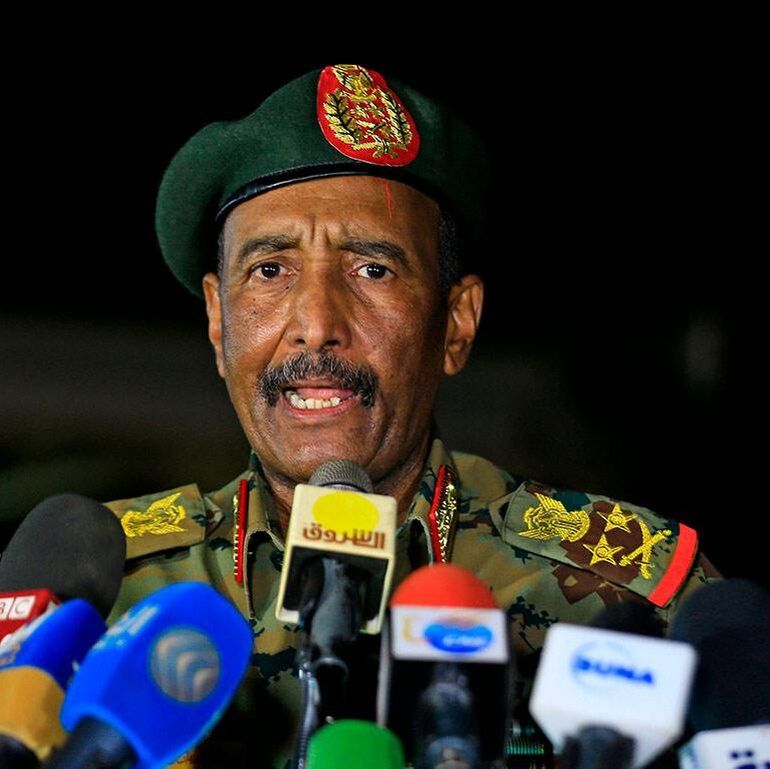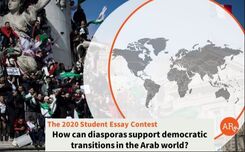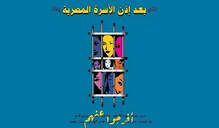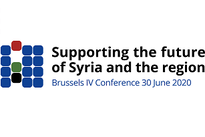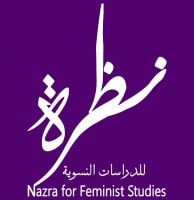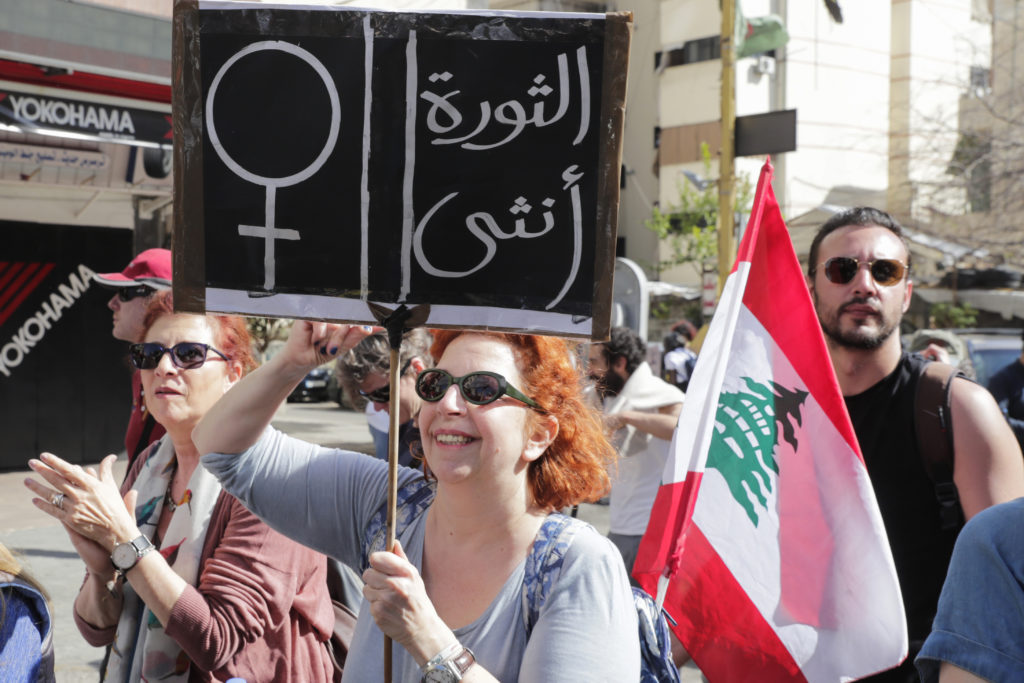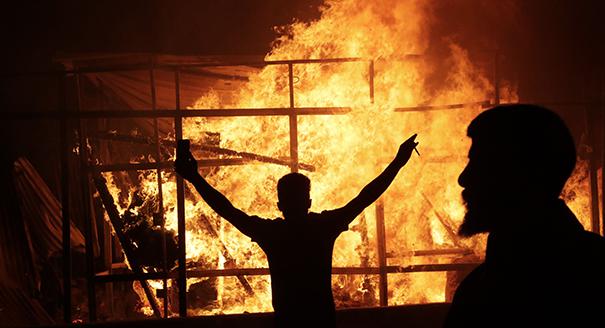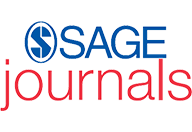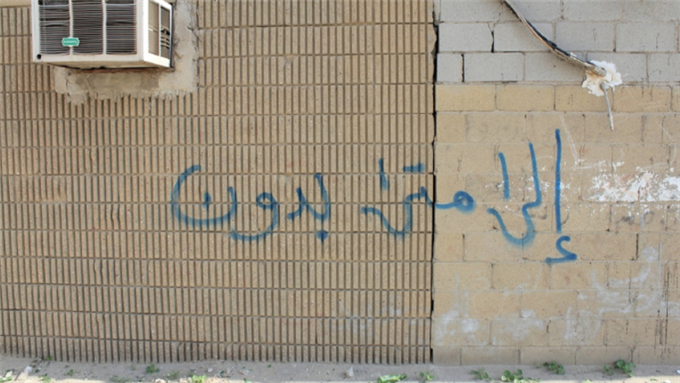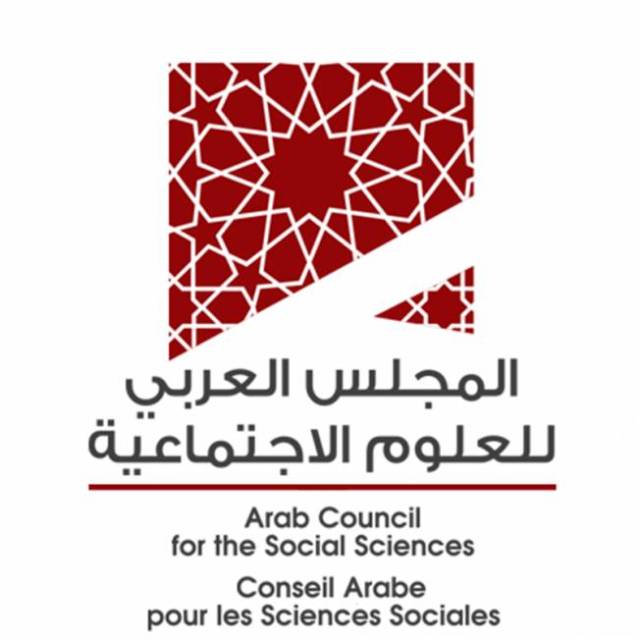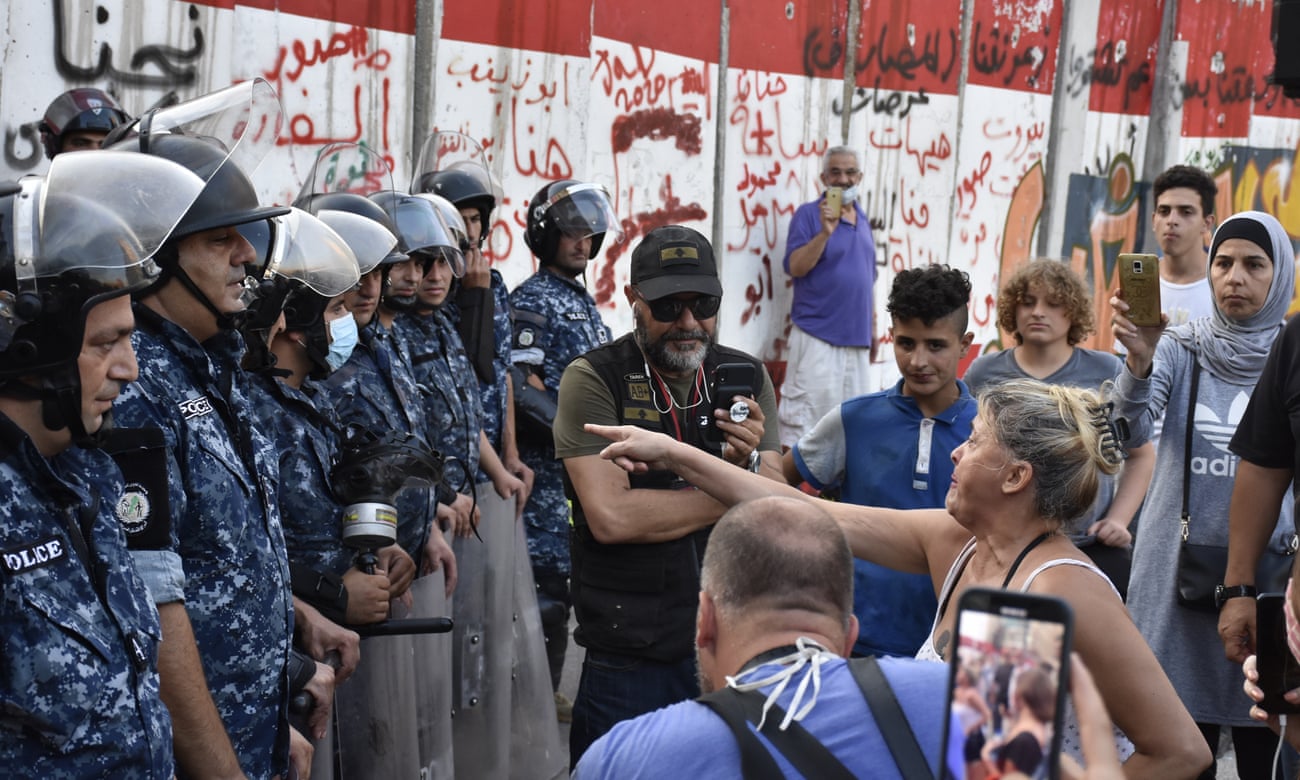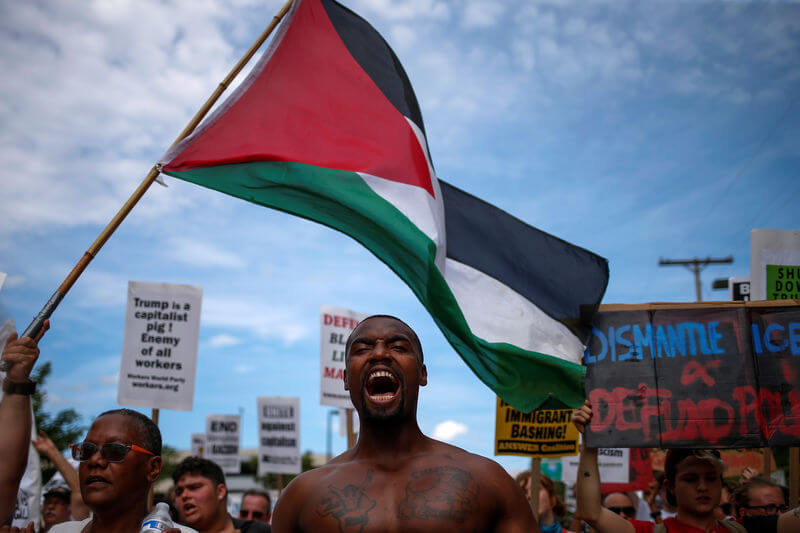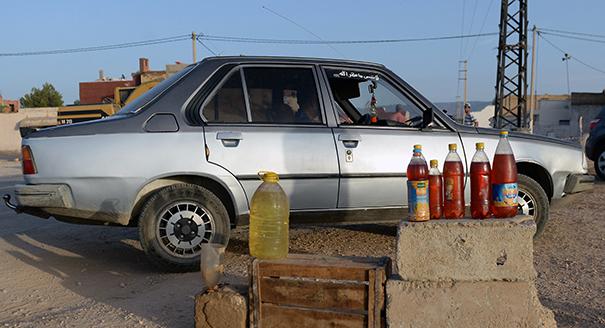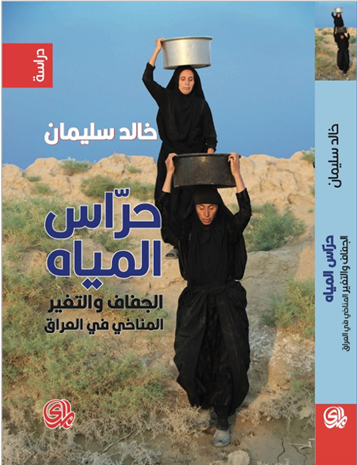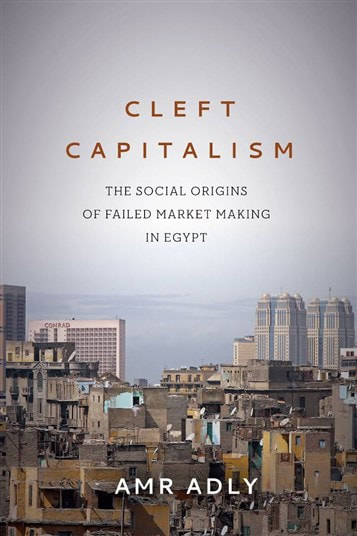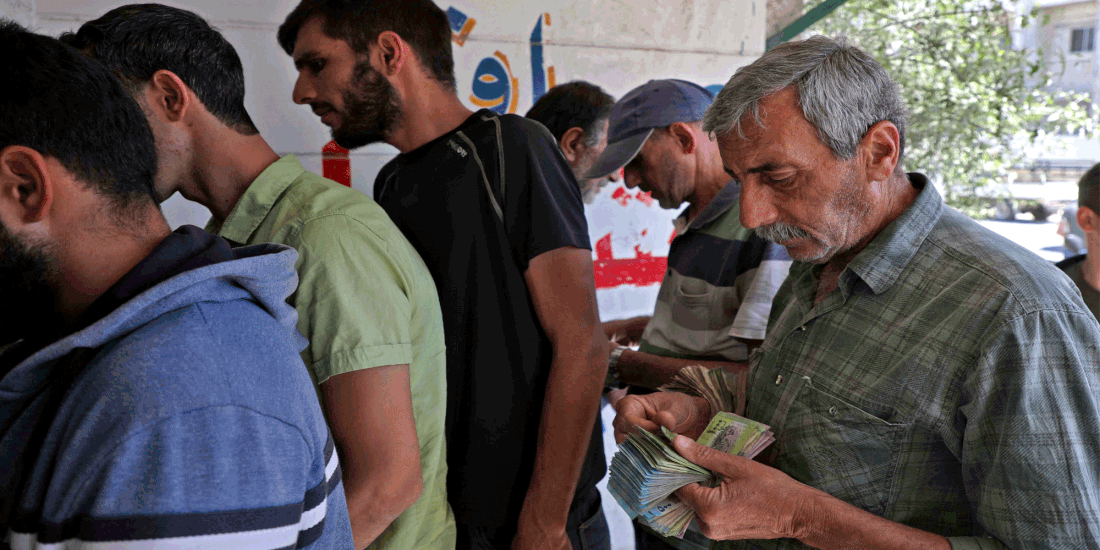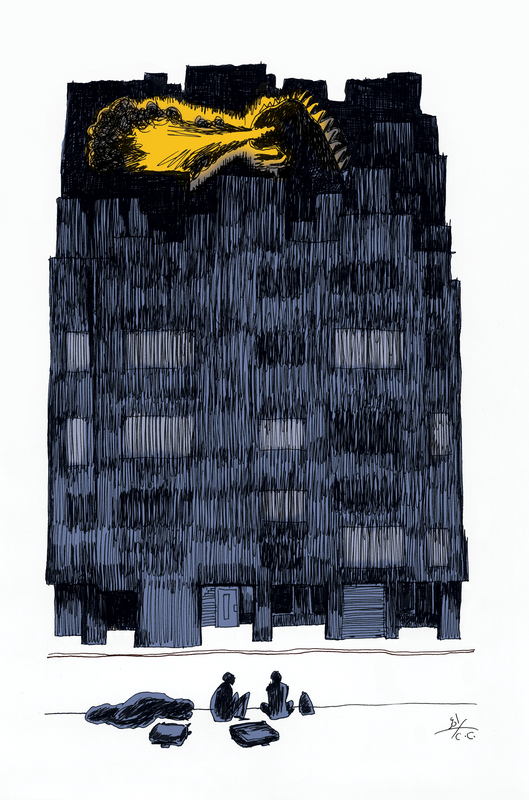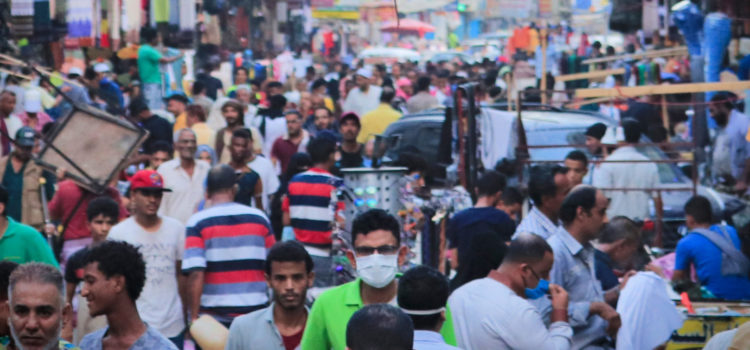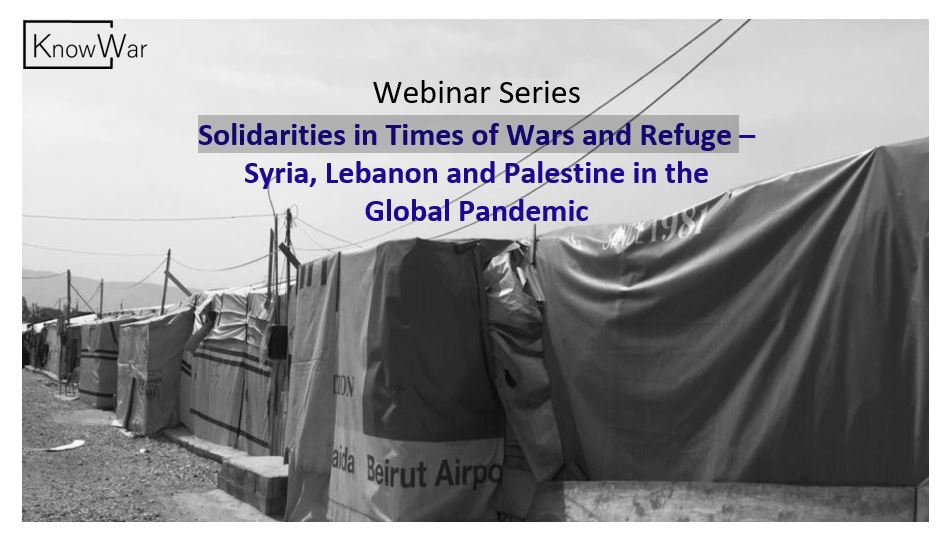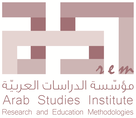ACTIVE ARAB VOICES
this site is owned by ASI-REM and NOT associated with any of our former partners
Click on the Red Dot
for the event info
for the event info
|
Envisioning Change: An Empirical Test of the Social Psychological Model of Utopian Thinking and Collective Action by Vivienne Badaan, Carla Akil, Yara Zebian, John T. Jost Abstract: This article provides the first empirical evidence of the theoretical model by Badaan et al. (2020) that proposes social psychological mechanisms whereby utopian thinking, which activates the social imagination, could enhance collective action intentions geared toward progressive social change. We anticipated that imagining better societies via utopian thinking would (a) increase social hope, (b) promote an abstract mindset that bridges psychological distance between the status quo in the present and the imagined, better future, (c) attenuate system justification motives, and (d) enhance social change-oriented collective action intentions. Using a structural equation modeling approach, our study provides preliminary support for some postulates of the theoretical model, paving the way for future research to further disentangle the psychological mechanisms by which utopian thinking influences collective action geared toward social change. for more click here Gender Inclusive Communication with Tarek Zeidan part II an Asfari Institute Webinar Open Event Women of Afghanistan: MY VOICE to MY HOME Part 5 of the Afghan series in collaboration with FEMENA Wednesday May 11th, at 11:00 AM EST, 6:00 PM Beirut time.
Speaker: Zahra Yagana, Founder and Head, Green Home Gender Inclusive Communication with Tarek ZeidanEvent Summary:
This event was organized with the collaboration of the Asfari Institute for Civil Society and Citizenship and the American University of Beirut. Asfari Institute director, Lina Abou Habib commenced the event with a brief introduction of guest speaker Tarek Zeidan, current executive director of Helem – the first LGBTQIA+ rights NGO in the Arab world, founded in Beirut, Lebanon – since 2012. Guest speaker Tarek Zeidan began by analyzing if language really reflects society, and if so in which ways. He provided examples of the power language has in changing or reifying the existing power structures in society, and that the neglect of inclusive language use invisibilizes people not just in the context of the Arab world, but specifically in the Arabic language as it is heavily gendered. click here for more By Mohamad Hojeije / AUB Student Book Launch
|
UPCOMING:
SPOTLIGHT: In Lebanon, the children of Syrian & Palestinian refugees frequently go unregistered at birth & are later denied basic rights http://arab.news/4ef6a with a quote by Lina Abou Habib.
Lebanon's first gender statistical report
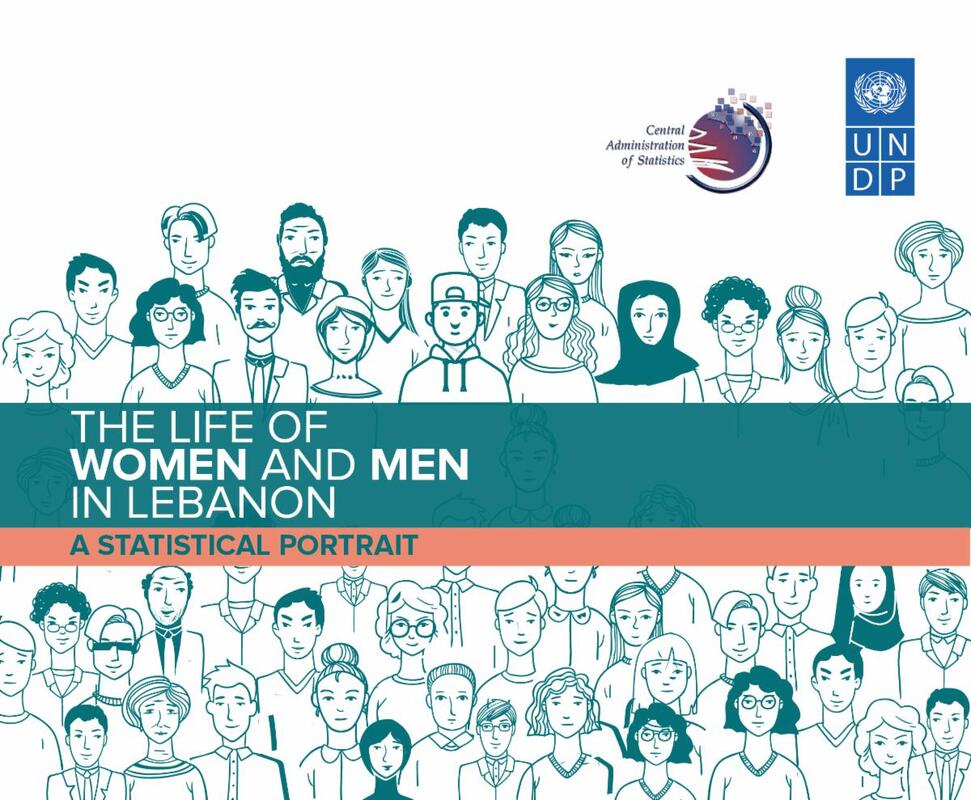
The United Nations Development Programme (UNDP) in partnership with the Central Administration of Statistics (CAS) launched Lebanon’s first gender statistical report entitled “The Life of Women and Men in Lebanon: A Statistical Portrait”.
The report provides the most comprehensive compilation of gender-disaggregated statistics and indicators and highlights key trends underpinning the country’s progress towards achieving gender equality over the past 15 years. نظراً للوضع الاقتصادي المتأزّم، ونظراً لتداعياته على الفئات المهمشة في المجتمع وعجز النظام والدولة بشكل كامل، سوف يتم إعادة تفعيل حملة "كتفي بكتفك"، وهي شبكة أمان اجتماعي تم تأسيسها العام الفائت. الهدف اليوم هو مساعدة طلاب المدارس والجامعات، الذين لا قدرة لهم على دفع رسوم التسجيل وتكاليف القرطاسية المتصاعدة بسبب التضخم، لإنقاذ جيل طلاب المدارس والجامعات ومنحه الفرصة للتقدم على الصعيدين الخاص والعام.
IN THE MEDIA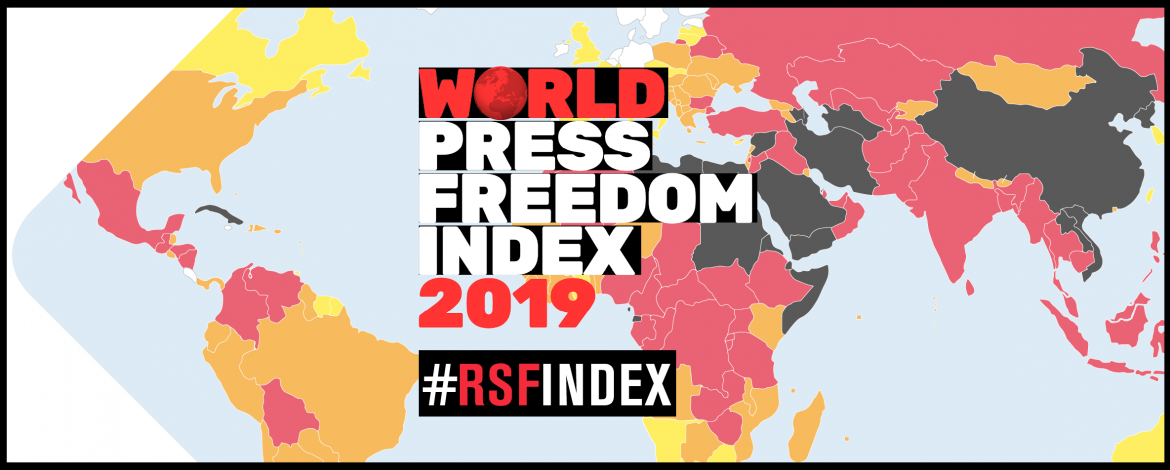
In remembrance of August 4 From "Scene Arabia"
Facebook Page |
Just Feminist Recovery
Feminist Solutions to Climate Crisis: Building a Green Future.
Objectives:
Objectives:
- Amplify the voices and vision of marginalized, grassroots women and non-conforming persons.
- Strengthen and mobilize social movements of marginalized, grassroots women and gender non-conforming persons
- Co create a bold and propositional blueprint for green, just and equitable feminist recovery from the pandemic, and beyond by bridging existing knowledge with grassroots voices and vision.
بيان بشأن التقرير من المقدم من بنت النيل للجنة السيداو عن زواج القاصرات
|
"Bent El-Nile" group has submitted its first report to the Esteemed Committee on the Elimination of Discrimination against Women (CEDAW Committee) on child marriage in accordance with Egyptian law, tackling the need for legal mechanisms to enact a penalty for such a crime, which would contribute to ending the problem and provide a safe life for girls in Egypt. It addressed and discussed the policies taken by the State to reduce this phenomenon. The report shined the light on the "national strategy to reduce early marriage" which was drafted in 2015 but wasn't taken into consideration, or criminalized by the Egyptian law despite the appeals of the National Council of Women and the National Council for Motherhood and Children, in addition to the requests of different Egyptian parliamentarians, to be considered a crime.
We therefore are calling to raise voices and share our recommendations with the State, in order to take the necessary measures to criminalize this phenomenon, which is widespread in rural governorates and upper Egypt. Recommendations: 1. Expedite the enactment of a law that criminalizes underage marriages, and all forms of violence against women and girls; amend the Penal Code to include provisions that impose penalties on whoever aids or abets the perpetration of such crimes, particularly the husbands and legal guardians; and increase the penalties imposed on public officials who participate in such crimes. 2. Draft and adopt a serious national strategy that aims to put an end to the crime of underage marriage in Egypt, in consultation with relevant international organizations and local civil society organizations. 3. Develop medical, psychological, and social rehabilitation programs for female victims of gender-based violence (GBV), especially the crime of underage marriage, in cooperation with the Ministry of Health, NCW, the National Council for Childhood and Motherhood (NCCM) and other relevant bodies. 4. Take the necessary measures to ensure the involvement of civil society organizations in the work to curb the spread of underage marriage crimes and raise societal awareness of the prohibition of such practice. |
SEXUAL AND REPRODUCTIVE RIGHTS
IN THE MEDITERRANEAN:
AN OVERVIEW OF AN INCREASINGLY WORRYING SITUATION
As the world prepares to celebrate International Safe Abortion Day on 28 September, “Medfeminiswiya” is publishing a comprehensive series of articles on women’s sexual and reproductive rights in the Mediterranean region. For the drafting of this content, our journalists reported from Algeria, Egypt, Italy, Palestine, Turkey, Lebanon, Morocco, Spain and Malta, countries where these fundamental rights are far from being achieved or remain very fragile.
Marked with negations, advances and regressions, the situation of sexual and reproductive rights (SRHR) in the Mediterranean region is quite worry- ing especially on the southern shore: as pointed out by the RAWSA MENA network to which we are dedicating an article, only Tunisia authorizes safe abortion. This explains why at the regional level, many women die each year as a result of complications in countries where abortion is prohibited, therefore, unsafe.
for more, click here
للغة العربية، انقر هنا
Marked with negations, advances and regressions, the situation of sexual and reproductive rights (SRHR) in the Mediterranean region is quite worry- ing especially on the southern shore: as pointed out by the RAWSA MENA network to which we are dedicating an article, only Tunisia authorizes safe abortion. This explains why at the regional level, many women die each year as a result of complications in countries where abortion is prohibited, therefore, unsafe.
for more, click here
للغة العربية، انقر هنا
Join us for the 7th Signature Ten Years On panel
30 September, 12pm EDT / 7pm Doha
"Activism in Exile: Diasporic Communities in the Wake of the Arab Uprisings"
30 September, 12pm EDT / 7pm Doha
"Activism in Exile: Diasporic Communities in the Wake of the Arab Uprisings"
Organized by the Center for International and Regional Studies and partners.
Live on http://Facebook.com/Jadaliyya
For more details, check here
Live on http://Facebook.com/Jadaliyya
For more details, check here
Feminists Battle for Justice 26 Years after Beijing
Thursday July 29th from 7:00 to 8:30pm Beirut time
Join Zoom event
https://us02web.zoom.us/j/83780218857
Join Zoom event
https://us02web.zoom.us/j/83780218857
The UN IVth Conference of Women (Beijing, 1995) has been a turning point globally in setting a framework and tangible parameters for gender equality worldwide. It was also a unique space where some 35000 from around the world gathered to make their voices heard. Despite significant advances however, women and girls continue to suffer discrimination, oppression and violence under patriarchal laws and systems. In this 90-minute discussion, four leading feminist scholar-activists from India, Morocco, Lebanon, and the United States who have been intimately involved in the struggle for gender equality since and also before Beijing 1995 will discuss what has changed and how and where do they see the feminist struggles for the future. The conversation will be moderated by Alison Freeland.
Funding Feminist Movements in the MENA: Analyzing the Current Ecosystem
Monday July 26th from 3:00 to 4:30pm Beirut time
Join Zoom event
https://zoom.us/j/91865436040
Join Zoom event
https://zoom.us/j/91865436040
The mobilization of resources continues to be a formidable obstacle that feminist movements face. Research conducted by AWID showed that despite new funding commitments made, women’s rights organizations receive only 0.13% of the total Official Development Assistance and only 0.4% of all gender-related aid. This circle will bring together feminist funds to discuss joint action and collaboration which seek to address the endemic issue of funding feminist movements and activism globally and in the MENA region. It will also discuss the outcome and implications of the Generation Equality Forum which just took place in Paris in early June.
The Asfari Institute at the American University of Beirut
Oxfam
Marsa for Sexual Health
Feminist Circles Series Announcement
SAVE THE DATES!
The Asfari Institute, Oxfam and Marsa for Sexual Health are pleased to announce the launch of the first collaborative feminist circles series.
This virtual series seeks to engage feminist activists, international organizations, and scholars in dialogue and discussions around contemporary feminist activism issues whilst at the same time reflecting over potential feasible solutions. In addition, we will use the learning from these circles to design accessible knowledge, communication and publication products which seek to contribute to furthering the outreach of the feminist circles as well as provide useful tools to activists on the ground.
The virtual series is open to interested audiences while ensuring that the space is conducive for reflection, as well as safe and secure.
This virtual series seeks to engage feminist activists, international organizations, and scholars in dialogue and discussions around contemporary feminist activism issues whilst at the same time reflecting over potential feasible solutions. In addition, we will use the learning from these circles to design accessible knowledge, communication and publication products which seek to contribute to furthering the outreach of the feminist circles as well as provide useful tools to activists on the ground.
The virtual series is open to interested audiences while ensuring that the space is conducive for reflection, as well as safe and secure.
OPEN EVENTS
Timetable and program of the first feminist circles series
June 14 to July 5
Timetable and program of the first feminist circles series
June 14 to July 5
Post-pandemic Feminism: How has the pandemic contributed to
transforming the feminist movement
Monday, June 21st from 3:00 to 4:30 pm Beirut time
Join Webinar
https://www.facebook.com/AsfariInstitute
transforming the feminist movement
Monday, June 21st from 3:00 to 4:30 pm Beirut time
Join Webinar
https://www.facebook.com/AsfariInstitute
The COVID-19 pandemic has transformed life as we know it, but more perilously increased the risk of gender-based violence (GBV), gender inequalities, oppression, and discrimination in addition to amplifying women’s care burden. In an article recently published by the Guardian, the COVID-19 pandemic has been described as an outbreak of disaster patriarchy, where the crisis is exploited to reassert patriarchal control and dominance, and rapidly erase hard-earned rights. Patriarchy has taken full advantage of the virus to reclaim power, as well as escalate the danger and violence against all women and non-binary. This discussion will shed light on the strategies that feminist movements have adapted to strengthen their activism in times of crisis and the absence or inadequacy of state assistance, the lessons learnt from the pandemic, and what strategies to be adopted in the post-pandemic world.
Young Feminist Futures: Revolutions and Intersectionality
Monday, June 14th from 3:00 to 4:30 pm Beirut time
Join Zoom Event
https://zoom.us/j/96844565051?pwd=WlY3S01qdmJvTkdFT1g1MlpicGVUZz09
Monday, June 14th from 3:00 to 4:30 pm Beirut time
Join Zoom Event
https://zoom.us/j/96844565051?pwd=WlY3S01qdmJvTkdFT1g1MlpicGVUZz09
From the Arab Spring to the new round of uprisings, young intersectional feminists within the revolutions have played a major role in framing the struggles and shaping the narrative of the movement through the power of young voices. According to a report by the European Institute of the Mediterranean (IEMed), the regional average for women’s representation in parliament has increased since the beginning of the Arab Spring, thus indicating some shift at least at the level of women's participation in decision making. In some countries, progress has come in leaps and bounds, while in others through incremental steps. This discussion will focus on the feminist narratives that evolved during and post-revolutions, the role that young feminists play to reclaim the public sphere, and the ways in which the boundaries have been pushed.
Funding feminist movements in the MENA: Analyzing the current ecosystem
Monday June 28th from 3:00 to 4:30 pm Beirut time
Monday June 28th from 3:00 to 4:30 pm Beirut time
The mobilization of resources continues to be a formidable obstacle that feminist movements face. Research conducted by AWID showed that despite new funding commitments made, women’s rights organizations receive only 0.13% of the total Official Development Assistance and only 0.4% of all gender-related aid. This circle will bring together feminist funds to discuss joint action and collaboration which seek to address the endemic issue of funding feminist movements and activism globally and in the MENA region.
The Recipient of the Dr. Hassan Abbas Award in Citizenship and Social Justice
|
That Asfari Institute for Civil Society and Citizenship at AUB proudly announces that Ms. Manar Ahmad Chorbaji is the winner of the Dr. Hassan Abbas Award for Citizenship and Social Justice. Manar is an FAS graduate of May 2021, who earned a BA in Media & Communications.The Award was presented during the AUB Faculty of Arts and Sciences 2021 Virtual Awards Ceremony on June 10, 2021, in the presence of AUB’s President Dr. Fadlo Khuri and FAS Dean Dr. Nadia El Cheikh.
|
Media Framing of Political Events in Lebanon:
From Uprising to Blast & Aftermath
From Uprising to Blast & Aftermath
Today, Lebanon features one of the most severe economic crises in its history. Combined with the coronavirus pandemic and deepening political gridlock, the residents of the country are experiencing acute economic dislocation, political alienation, and daily hazards to their lives and wellbeing. The October 17 Revolution and August 4 Beirut Port explosion simultaneously—albeit different—reflected and added to the underlying features producing such crises. This panel aims to explore how the Lebanese media are dealing with this turmoil, shedding light on the framing of events based on political agendas.
Organized by the Middle East and Islamic Studies Program at GMU, Arab Studies Institute, and the Asfari Institute at AUB
Friday, 11 June 2021
Facebook.com/JADALIYYA
Facebook.com/AsfariInstitute
12 pm EDT, 5 pm London, 7 pm Beirut
Organized by the Middle East and Islamic Studies Program at GMU, Arab Studies Institute, and the Asfari Institute at AUB
Friday, 11 June 2021
Facebook.com/JADALIYYA
Facebook.com/AsfariInstitute
12 pm EDT, 5 pm London, 7 pm Beirut
TEN YEARS ON Project
Organizers: Arab Studies Institute, Princeton’s Arab Barometer, George Mason’s Middle East and Islamic Studies Program.
Co-Sponsors: Georgetown University (Center for Contemporary Arab Studies), American University of Beirut (Asfari Institute), Arab Council for the Social Sciences, Brown University (Center for Middle East Studies), UC Santa Barbara (Center for Middle East Studies), Harvard University (Center for Middle East Studies), University of Exeter (Institute of Arab and Islamic Studies), Birzeit University (Department of Political Science), University of Chicago (Chicago Center for Contemporary Theory), Stanford University (Program on Arab Reform and Democracy, Stanford University), AUC Affiliates, Georgetown University (Qatar) Center For International And Regional Studies (CIRS), The Global Academy (MESA Affiliated), Institute of Palestine Studies.
Organizers: Arab Studies Institute, Princeton’s Arab Barometer, George Mason’s Middle East and Islamic Studies Program.
Co-Sponsors: Georgetown University (Center for Contemporary Arab Studies), American University of Beirut (Asfari Institute), Arab Council for the Social Sciences, Brown University (Center for Middle East Studies), UC Santa Barbara (Center for Middle East Studies), Harvard University (Center for Middle East Studies), University of Exeter (Institute of Arab and Islamic Studies), Birzeit University (Department of Political Science), University of Chicago (Chicago Center for Contemporary Theory), Stanford University (Program on Arab Reform and Democracy, Stanford University), AUC Affiliates, Georgetown University (Qatar) Center For International And Regional Studies (CIRS), The Global Academy (MESA Affiliated), Institute of Palestine Studies.
Join the Asfari Institute's Third (3rd) Feminist Roundtable entitled:
How has the discourse on gender-based violence been changing among Arab young activists?
Wednesday, June 2nd, 2021 at 5.00 PM – 6.30 PM (Beirut time)
Join Zoom Meeting
https://zoom.us/j/5823787038?pwd=cmtoTUxqdmhrRk1Pa3c2R0lXeitOZz09
Join us live on:
https://www.facebook.com/AsfariInstitute
How has the discourse on gender-based violence been changing among Arab young activists?
Wednesday, June 2nd, 2021 at 5.00 PM – 6.30 PM (Beirut time)
Join Zoom Meeting
https://zoom.us/j/5823787038?pwd=cmtoTUxqdmhrRk1Pa3c2R0lXeitOZz09
Join us live on:
https://www.facebook.com/AsfariInstitute
The Asfari Institute for Civil Society and Citizenship is launching our new
Gender and Feminism Round Table Series
Join us for our Second (2nd) event on
"Analysing current LGBTQ activism in the region:
Who are the new authors of the public narratives?"
Gender and Feminism Round Table Series
Join us for our Second (2nd) event on
"Analysing current LGBTQ activism in the region:
Who are the new authors of the public narratives?"
Date: Thursday April 29th, 2021
Time: From 2:00 pm to 3:15 pm Beirut Time
Moderator:
Dr. Carmen Geha, Activist, AUB Professor of Public Administration,
& co-founder of CIBL for Women
Guest speakers:
Tarek Zeidan, Executive director, Helem (Lebanon)
Khawla Bouaziz, Secretary General, Mawjoudin (Tunisia)
Join Zoom Meeting
https://zoom.us/j/95575815932
Join us live on:
https://www.facebook.com/AsfariInstitute
for more info:
https://www.activearabvoices.org
Time: From 2:00 pm to 3:15 pm Beirut Time
Moderator:
Dr. Carmen Geha, Activist, AUB Professor of Public Administration,
& co-founder of CIBL for Women
Guest speakers:
Tarek Zeidan, Executive director, Helem (Lebanon)
Khawla Bouaziz, Secretary General, Mawjoudin (Tunisia)
Join Zoom Meeting
https://zoom.us/j/95575815932
Join us live on:
https://www.facebook.com/AsfariInstitute
for more info:
https://www.activearabvoices.org
The Asfari Institute for Civil Society and Citizenship is launching our new
Gender and Feminism Round Table Series
Join us for our first event on
“Gender, Conflict and Refugees: the Case of Syria”
Gender and Feminism Round Table Series
Join us for our first event on
“Gender, Conflict and Refugees: the Case of Syria”
Join Zoom Event at:
https://zoom.us/j/99967056278
Join us live on:
https://www.facebook.com/AsfariInstitute
https://zoom.us/j/99967056278
Join us live on:
https://www.facebook.com/AsfariInstitute
The round table will begin with a keynote address by AUB’s FAS Dean Nadia El Cheikh followed by a partial screening of Carol Mansour’s documentary “Nehna Mou Heik” https://vimeo.com/81968642
Program of the roundtable:
- Keynote address II Dean Nadia El Cheikh, AUB FAS
- Film Viewing II Nehna Mou Heik II Carol Mansour, Film Director
- Roundtable discussion moderated by Dr. Muna Khalidi, Forward Productions with:
- Rola el Rokbi II Director, Women Now for Development
- Sabah el Hallak II Director, Moubadarat al Mouwatana
- Carol Mansour II Film Director, Forward Productions
- Final remarks II Dr. Nadia El Cheikh and Carol Mansour
Feminist Mobilizations at the time of COVID-19:
Experiences from the Middle East,
Latin America, and the Caribbean
Wednesday, January 27, 2021
7:00 – 8:30 p.m. Beirut time
Virtual event
Experiences from the Middle East,
Latin America, and the Caribbean
Wednesday, January 27, 2021
7:00 – 8:30 p.m. Beirut time
Virtual event
Join us for a roundtable conversation with and between feminist activists and scholars from the Caribbean and Latin America, Gabrielle Hosein and Betilde Muñoz-Pogossian, and from the Middle East, Lina Abou-Habib and Mozn Hassan.
Feminists all over the world have responded to and mobilized to address the wide-ranging inequalities and forms of gender-based violence exacerbated by the COVID-19 pandemic. Women have been disproportionately affected in terms of unemployment, limited access to adequate health care, political marginalization, and increasing and intensified forms of gender-based violence. What are feminists challenging, what are they concretely suggesting and what are their strategies, especially in terms of collaboration with national governments, international organizations, and transnational feminist campaigns? This webinar aims to discuss feminist mobilization and strategies at the time of COVID-19 in relation to Latin America, the Caribbean, and the Middle East. The idea is to look at both specificities and similarities in feminist struggles during this challenging period.
Feminists all over the world have responded to and mobilized to address the wide-ranging inequalities and forms of gender-based violence exacerbated by the COVID-19 pandemic. Women have been disproportionately affected in terms of unemployment, limited access to adequate health care, political marginalization, and increasing and intensified forms of gender-based violence. What are feminists challenging, what are they concretely suggesting and what are their strategies, especially in terms of collaboration with national governments, international organizations, and transnational feminist campaigns? This webinar aims to discuss feminist mobilization and strategies at the time of COVID-19 in relation to Latin America, the Caribbean, and the Middle East. The idea is to look at both specificities and similarities in feminist struggles during this challenging period.
Reflections on Mass Protests
&
Uprisings in the Arab World
(Two Panels)
Monday, 25 January
1 PM EST and 2:30 PM EST
Part 1 @ 8:00 PM Beirut Time, Part 2 @ 9:30 PM Beirut Time
&
Uprisings in the Arab World
(Two Panels)
Monday, 25 January
1 PM EST and 2:30 PM EST
Part 1 @ 8:00 PM Beirut Time, Part 2 @ 9:30 PM Beirut Time
Ten Years On
Mass Protests and Uprisings in the Arab World
Mass Protests and Uprisings in the Arab World
December 17, 2020 marked the tenth anniversary of the start of the Arab uprisings in Tunisia. Beginning in 2011, mass uprisings swept North Africa and the Middle East, spreading from the shores of Tunisia to Egypt, Libya, Syria, Yemen, Bahrain, and the Eastern Province of the Arabian Peninsula. A “second wave” of mass protests and uprisings manifested during 2019 in Sudan, Algeria, Lebanon, and Iraq. The persistence of demands for popular sovereignty even in the face of re-entrenched authoritarianism, imperial intervention, and civil strife is a critical chapter in regional and global history.
In an effort to mark, interrogate, and reflect on the Arab uprisings, we launch a yearlong set of events, reflections, and conversations. We hope to produce resources for educators, researchers, students, and journalists to understand the last decade of political upheaval historically and in the lived present.
Over the past decade, a plethora of events, texts, and artistic and cultural productions have navigated the last decade’s spectrum of affective and material registers. We hope to contribute to these efforts through a historically grounded, theoretically rigorous approach that collaboratively interrogates the multiple questions the Arab uprisings continue to pose.
In an effort to mark, interrogate, and reflect on the Arab uprisings, we launch a yearlong set of events, reflections, and conversations. We hope to produce resources for educators, researchers, students, and journalists to understand the last decade of political upheaval historically and in the lived present.
Over the past decade, a plethora of events, texts, and artistic and cultural productions have navigated the last decade’s spectrum of affective and material registers. We hope to contribute to these efforts through a historically grounded, theoretically rigorous approach that collaboratively interrogates the multiple questions the Arab uprisings continue to pose.
Organized by: Arab Studies Institute, Princeton’s Arab Barometer, and George Mason’s Middle East and Islamic Studies Program. Co-Sponsored by: Georgetown University (Center for Contemporary Arab Studies), American University of Beirut (Asfari Institute), Arab Council for the Social Sciences, Brown University (Center for Middle East Studies), UC Santa Barbara (Center for Middle East Studies), Harvard University (Center for Middle East Studies), University of Exeter (Institute of Arab and Islamic Studies), Birzeit University (Department of Political Science), Stanford University (Center for Democracy, Development, and Rule of Law), AUC Affiliates, Georgetown University (Qatar), The Global Academy (MESA Affiliated), Institute of Palestine Studies.
لهذه الأسباب يمكن أن نحتفي بعام 2020
لينا أبو حبيب - باحثة وحقوقية نسوية لبنانية
معهد الأصفري للمجتمع المدني والمواطنة
الجامعة الأميركية في بيروت
لينا أبو حبيب - باحثة وحقوقية نسوية لبنانية
معهد الأصفري للمجتمع المدني والمواطنة
الجامعة الأميركية في بيروت
سأحتفي بثورة أولئك الذين يعارضون النظام، والذين يحاربون القمع والظلم يومياً وبأساليب كثيرة مختلفة، والذين يرفضون الاستسلام...عجَّت منصات التواصل الاجتماعي في الفترة الأخيرة، بمنشورات احتفالية عقب الإعلان عن إقرار قانون يعاقب التحرش الجنسي وعن إجراء تعديلات على قانون حماية النساء وسائر أفراد الأسرة من العنف الأسري
فنَّدت الكاتبة والناشطة النسوية الرصينة، مايا العمّار، تلك الانتصارات المزعومة وأثبتت بما لا يدع مجالاً للشك أن ليس ثمّة ما يستدعي البهجة أو
التهليل، وأن الإنجازات المذكورة ليست سوى مجرد إجراءات شكلية زائفة بل وحتى محاولة لتلميع نظام رثّ وإبرازه كنظامٍ مُتحضِّر مناصر للمرأة
للمزيد انقر هنا
فنَّدت الكاتبة والناشطة النسوية الرصينة، مايا العمّار، تلك الانتصارات المزعومة وأثبتت بما لا يدع مجالاً للشك أن ليس ثمّة ما يستدعي البهجة أو
التهليل، وأن الإنجازات المذكورة ليست سوى مجرد إجراءات شكلية زائفة بل وحتى محاولة لتلميع نظام رثّ وإبرازه كنظامٍ مُتحضِّر مناصر للمرأة
للمزيد انقر هنا
For the English version, Please click here
Women in the Sun: Precarity and the Future
among Syrian Refugee Women in Lebanon
Yara Tarabulsi
among Syrian Refugee Women in Lebanon
Yara Tarabulsi
During the months of July to September, my fieldwork in Lebanon led me to drastically different places: from the dusty, dry agglomeration of shacks in a small town in the middle of the Bekaa Valley to a hot and humid hectic sewing workshop hidden within the serpentine alleyways of the Shatila Palestinian refugee camp. I ended up in these places to speak with Syrian refugee women about their different experiences of laboring in Lebanon. Through this ethnographic work, I aspired to analyze how the Lebanese state’s policies towards Syrian refugee labor have affected the way refugee women navigate the labor market, as well as how the involvement of international and local humanitarian organizations has played into their choices and prospects while doing so.
Click for more
Click for more
It is safe to say that policy change and legal reform toward gender equality has been rather slow and partial in Lebanon. For instance, and compared to other countries in the MENA region, Lebanon has undergone hardly any significant reform in the 16 different religious family codes. This is despite the fact that there has been no dearth of sustained advocacy and lobbying on the part of women and feminist organisations throughout the last four decades to bring about reforms in family laws and protections against gender-based violence. However, the last twenty years have nevertheless witnessed an important shift namely by bringing demands for gender equality into the public domain and as part of the prevailing public and political discourse. Another major advance was the fact that women themselves took over the public space and began to speak openly about their own experiences of oppression and discrimination and, in doing so, contributed to influencing public opinion as to the validity of their demands for change
click here for more
click here for more
Bourdieu, Latour and Rasha Abbas:
The Uses of Actor-Network Theory
for Studying the Field(s) of Cultural Production
in the Middle East and North Africa
Felix Lang
Philipps-Universität Marburg, Germany
The Uses of Actor-Network Theory
for Studying the Field(s) of Cultural Production
in the Middle East and North Africa
Felix Lang
Philipps-Universität Marburg, Germany
Beirut Blast Solidarity
Tainted with Racism
ANTI-RACISM MOVEMENTANT
|
On August 4 2020, a massive explosion hit Lebanon’s capital that was caused by a blast of 2750 tonnes of ammonium nitrate stored in Beirut’s port. The explosion caused the death of more than 150 people, thousands of injuries and disappearances, making a lot of families homeless.
Before the explosion, migrant workers had been demanding to be evacuated from Lebanon and to go back home. Today, their families are worried about their safety in a country that not only dehumanizes them but also does not consider their security and survival an urgent priority in a constantly changing situation in terms of coronavirus lockdown and official security protocols. For more, click here |
الثأر لبيروت ولسكّانها
كريم نمور.
|
"الثأر"، لأن التحقيق والعدالة خذلانا... الثأر، لأن النظام يستغلّ قوّته لإحتلال الفضاء العام ومنابره لتبييض صورته، محاولاً إمّا رمي المسؤولية على القضاء (الذي يعجز هو الآخر الدفاع عن نفسه بفعل موجب التحفظ) وإمّا تشتيت المسؤولية على مختلف أركان النظام بغية إغراقها في تفاصيل تركيبته وهلاكها... والثأر، لأن التحقيق والعدالة محتكران من قبل النظام المجرم، فكيف عسى للمجرم أن يحقق ويحاكم ذاته؟ وهو نفسه من شوّه، قبل أيّام من الإنفجار، أنشودة "بيروت ستّ الدنيا" للشاعر نزار قبّاني، مستبدلاً عبارة "الثورة تولد من رحم الأحزان" بلالات بائسة، وكأنه يسعى لمحو الثورة وواقع الأحزان من ذاكرتنا المشتركة. أمّا بعد فشله بتلك المهمّة، ها هو يفجّر بطلة الأنشودة، بيروت ولم تمضِ ساعات على الإنفجار الجرمي حتى تبنّت الحكومة بيان المجلس الأعلى للدفاع، لا سيما لجهة إعلان بيروت مدينة منكوبة وإعلان حالة الطوارئ فيها لمدة أسبوعين قابلة للتجديد (أي من 04/08/2020 لغاية 18/08/2020)، وذلك سنداً للمرسوم الإشتراعي رقم 52 الصادر بتاريخ 05/08/1967، على أن تتولى السلطة العسكرية العليا فوراً صلاحية المحافظة على الأمن فكيف نقرأ إجراء الحكومة هذا لإدارة الكوارث الوطنية، في ظلّ مطالبات الثأر الشعبية؟ |
أتى إنفجار بيروت في 4 آب الماضي ليرنّ ناقوس النظام مجدداً. فيتحول الثأر (أو رغبته) إذ ذاك إلى انتفاضة مستجدة لاستعادة عدالة – ومعها سردية لواقعنا – يحاول النظام بائساً التمسك باحتكارها
للمزيد من المعلومات، انقر هنا
للمزيد من المعلومات، انقر هنا
Beirut Catastrophe
|
Through our partner Jadaliyya
By Bassam Haddad
05 August 2020 Like so many, I am beyond mad at the criminal incompetence and corruption of the Lebanese Government, Bureaucracy, and their attendant business cronies/supporters who privilege profit over everything with almost no checks on their horror, save the self-congratulatory "open" discourse in public spaces, which serves more to vent than to exact concrete accountability. Hence the necessary courageous protests and mobilization we have observed for some time being the beaming light amid rot. A much more careful and detailed account is Ziad Abu-Rish's take below on what happened yesterday, and implications. I asked him to synthesize his social media comments for potential publication (perhaps on Jadaliyya). Thanks Ziad. Please consider joining our fundraising campaign to support the Lebanese Red Cross here, Kindly click here |
By Ziad Abu-Rish
The nature of Tuesday’s explosion in the port of Beirut and the extent of the damage across the city and beyond is not yet clear. There are plenty of unconfirmed reports and it is hard to take official statements as transparent.
That being said, the effects of the explosion were felt across the city and beyond. For those familiar with the geography, nearby areas such Karantina and Gemmayzeh as well as further away areas such as Manara, Hamra, Burj Hammoud, Sin al-Fil, and Brummana felt the explosion.
The port area itself is largely decimated, with adjacent neighborhoods destroyed and those one neighborhood removed reportedly looking like a warzone. Much of the most-damaged areas are only now being accessed by those searching for victims, rescue teams having been forced to wait out the flames or make sure remaining structures would not collapse on them.
The anecdotes and reports of windows shattering, balcony doors collapsing, and ceilings caving in across Beirut (to say nothing of the “exterior damage” on the streets that are today lined with broken glass) and beyond are true and a testament to how powerful the explosion was. click here for more
The nature of Tuesday’s explosion in the port of Beirut and the extent of the damage across the city and beyond is not yet clear. There are plenty of unconfirmed reports and it is hard to take official statements as transparent.
That being said, the effects of the explosion were felt across the city and beyond. For those familiar with the geography, nearby areas such Karantina and Gemmayzeh as well as further away areas such as Manara, Hamra, Burj Hammoud, Sin al-Fil, and Brummana felt the explosion.
The port area itself is largely decimated, with adjacent neighborhoods destroyed and those one neighborhood removed reportedly looking like a warzone. Much of the most-damaged areas are only now being accessed by those searching for victims, rescue teams having been forced to wait out the flames or make sure remaining structures would not collapse on them.
The anecdotes and reports of windows shattering, balcony doors collapsing, and ceilings caving in across Beirut (to say nothing of the “exterior damage” on the streets that are today lined with broken glass) and beyond are true and a testament to how powerful the explosion was. click here for more
